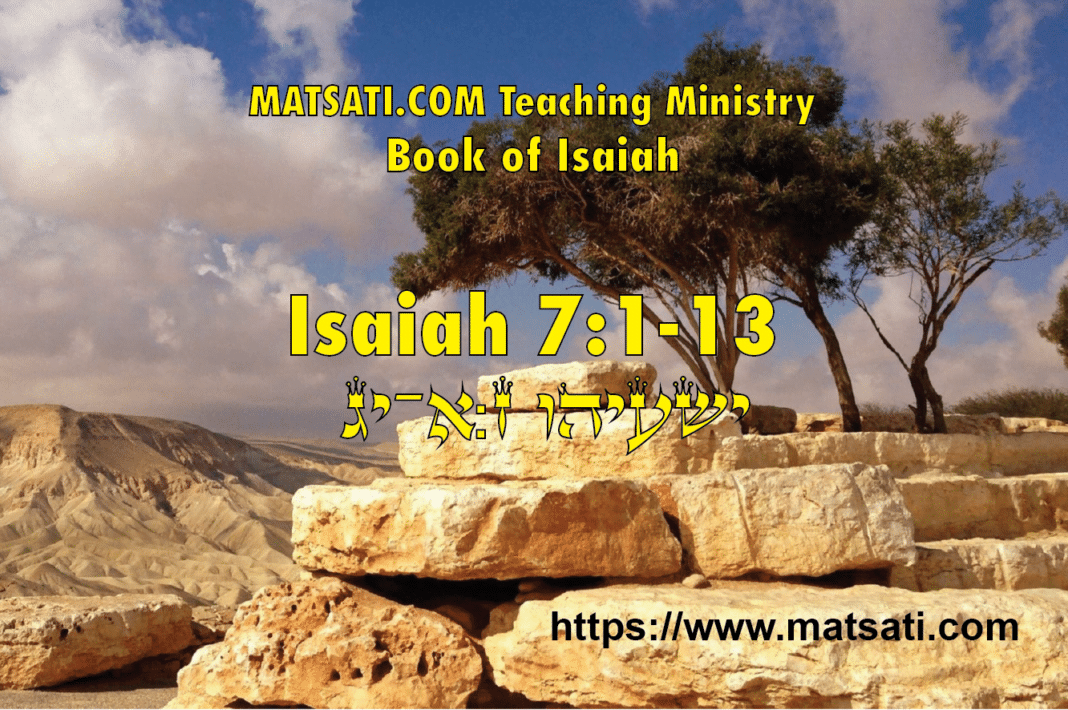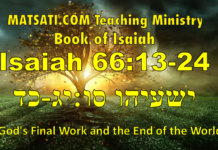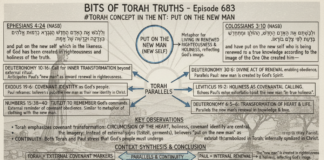Table of Contents
Introduction to Isaiah 7:1-13
According to most commentaries, Isaiah chapters 7-39 are centered around the theme of trust. There appears to be a significant amount of time Isaiah is spending on this subject due to this being a major theme throughout all of the Scriptures, trusting in God is foundational to our faith. Remember Yeshua said that he came to give abundance / fullness of life to God’s people (John 10:10). We note that an abundant life in the biblical sense is not necessarily worldly riches or material goods, but as having a relationship with God, having a transformed life as being merciful and caring towards others, and eternal life. Chapters 7-12 narration centers around Assyria attacking Ahaz who had the opportunity to have faith that God would save him and his people. This idea of trust was meant to bring glory to God, but instead the people would not trust in the Lord and return to His holy and righteous ways, and so the nation was destroyed, and ultimately exiled into Babylon. The Lord God would then work in the hearts of kings to allow the people to return to the land, i.e. the restoration of Israel from captivity. The idea was that Israel was originally to be a light unto the nations as being the people through whom God had revealed himself to the world. This was lost through her pride and self-ambitions and refusal to trust in the Lord. When a person joins him or herself with the ways of the world, he or she loses both the message and the mission to serve God. The ways of the world tend to draw one away from the things of God for the purpose of forgetting in exchange for the pursuit of one’s personal lusts.
In Isaiah 7 we find one of the first major messianic prophecies (7:14) of the עִמָּ֥נוּ אֵֽל Emmanuel (God with us) and the virgin birth. These chapters, 7, 8, and 9 use the imagery of children, innocence, and a child’s trust, to illustrate the power of God in the lives of His people. This theme is illustrated according to Isaiah 7 שְׁמ֖וֹ עִמָּ֥נוּ אֵֽל “his name is Emmanuel” and in Isaiah 8 we read שְׁמ֔וֹ מַהֵ֥ר שָׁלָ֖ל חָ֥שׁ בַּֽז “his name is Maher-shalal-hash-baz,” and the royal child according to Isaiah 9:5 שְׁמ֜וֹ פֶּ֠לֶא יוֹעֵץ֙ אֵ֣ל גִּבּ֔וֹר אֲבִיעַ֖ד שַׂר־שָׁלֽוֹם “his name is wonderful counselor, mighty God, everlasting father, prince of peace.” Isaiah speaks of these child kings sent by God, which illustrates an important principle concerning children and their unconditional trust and love. If the people would turn from their sinful ways, and seek the God of Israel, they will see His light, His truth, and His wisdom for their lives and turn from the darkness, despair, and depression that comes with walking in the ways of the nations. It seems natural that the Lord would provide us with a Messianic expectation in the midst of these narratives of trusting in him and being faced with an almost undefeatable foe. Trusting in the Lord God Almighty is only achieved by gaining the divine perspective, realizing that the Lord God Almighty has everything under His control, and that our focus should be upon the Lord, being at peace with men through showing mercy and justice taking the Torah perspective taught to us by Yeshua the Messiah, to live the servant attitude. What these things reveal to us is the spiritual counterparts to this physical world, how everything in our lives is connected to the spirit realm, regardless of who one born from the seed of Abraham or from the nations. Walking in God’s holy ways according to His word demonstrates the fruits of the Spirit which are expounded upon at length in the Apostolic Writings which is coupled to God literally dwelling in our midst (Torah centric principle) through the indwelling of God’s Holy Spirit. We note how the Torah illustrates how God cares about not just spiritual things, but also about how we live our lives here on earth, and the reason is these things are related to sin as sin causes one to live in such a way as to forsake the truth which leads to the eventual loss of relationship with the Lord. Isaiah opens chapter 7 saying the following:
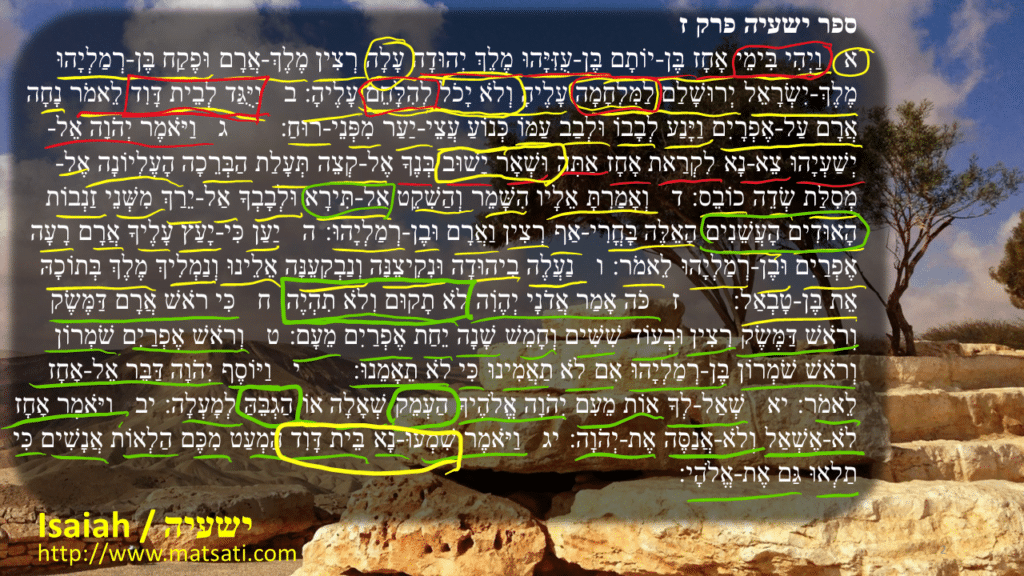
ספר ישעיה פרק ז
א וַיְהִ֡י בִּימֵ֣י אָ֠חָז בֶּן־יוֹתָ֨ם בֶּן־עֻזִּיָּ֜הוּ מֶ֣לֶךְ יְהוּדָ֗ה עָלָ֣ה רְצִ֣ין מֶֽלֶךְ־אֲ֠רָם וּפֶ֨קַח בֶּן־רְמַלְיָ֤הוּ מֶֽלֶךְ־יִשְׂרָאֵל֙ יְר֣וּשָׁלִַ֔ם לַמִּלְחָמָ֖ה עָלֶ֑יהָ וְלֹ֥א יָכֹ֖ל לְהִלָּחֵ֥ם עָלֶֽיהָ׃
Isaiah 7:1 state, “And it came to pass in the days of Ahaz the son of Jotham, (וַיְהִ֡י בִּימֵ֣י אָ֠חָז בֶּן־יוֹתָ֨ם) the son of Uzziah, king of Judah, (בֶּן־עֻזִּיָּ֜הוּ מֶ֣לֶךְ יְהוּדָ֗ה) that Rezin the king of Syria, (עָלָ֣ה רְצִ֣ין מֶֽלֶךְ־אֲ֠רָם) and Pekah the son of Remaliah, king of Israel, (וּפֶ֨קַח בֶּן־רְמַלְיָ֤הוּ מֶֽלֶךְ־יִשְׂרָאֵל֙) went up toward Jerusalem to war against it, but could not prevail against it. (יְר֣וּשָׁלִַ֔ם לַמִּלְחָמָ֖ה עָלֶ֑יהָ וְלֹ֥א יָכֹ֖ל לְהִלָּחֵ֥ם עָלֶֽיהָ)” Here Isaiah takes us to the days of Ahaz (בִּימֵ֣י אָ֠חָז) as it is through history that God reveals Himself to His people and speaks of the prophetic future expectation through the revelation of God. We note that a lot of prophetic messages in the biblical text are bimodal, having both a present-day expectation and a future expectation. Because of these things we must take a historical-narrative approach to understanding prophecy. We note how Isaiah introduces this section saying, וַיְהִ֡י בִּימֵ֣י אָ֠חָז בֶּן־יוֹתָ֨ם בֶּן־עֻזִּיָּ֜הוּ מֶ֣לֶךְ יְהוּדָ֗ה connecting Ahaz to Uzziah. What we are being given here is the progression of history and the coming fulfillment of what Isaiah had previously prophesied coming to pass. Note that according to 2 Kings 16:7-9 Ahaz appealed to Assyria for help as opposed to appealing to God.

ספר מלכים ב פרק טז
ז וַיִּשְׁלַח אָחָז מַלְאָכִים אֶל-תִּגְלַת פְּלֶסֶר מֶלֶךְ-אַשּׁוּר לֵאמֹר עַבְדְּךָ וּבִנְךָ אָנִי עֲלֵה וְהוֹשִׁעֵנִי מִכַּף מֶלֶךְ-אֲרָם וּמִכַּף מֶלֶךְ יִשְֹרָאֵל הַקּוֹמִים עָלָי: ח וַיִּקַּח אָחָז אֶת-הַכֶּסֶף וְאֶת-הַזָּהָב הַנִּמְצָא בֵּית יְהֹוָה וּבְאֹצְרוֹת בֵּית הַמֶּלֶךְ וַיִּשְׁלַח לְמֶלֶךְ-אַשּׁוּר שֹׁחַד: ט וַיִּשְׁמַע אֵלָיו מֶלֶךְ אַשּׁוּר וַיַּעַל מֶלֶךְ אַשּׁוּר אֶל-דַּמֶּשֶֹק וַיִּתְפְּשֶֹהָ וַיַּגְלֶהָ קִירָה וְאֶת-רְצִין הֵמִית:
2 Kings 16:7-9
16:7 So Ahaz sent messengers to Tiglathpileser king of Assyria, saying, I am thy servant and thy son: come up, and save me out of the hand of the king of Syria, and out of the hand of the king of Israel, which rise up against me. 16:8 And Ahaz took the silver and gold that was found in the house of the LORD, and in the treasures of the king’s house, and sent it for a present to the king of Assyria. 16:9 And the king of Assyria hearkened unto him: for the king of Assyria went up against Damascus, and took it, and carried the people of it captive to Kir, and slew Rezin. (KJV)
It looks as if Ahaz had paid a large sum of money to get help. This however had huge spiritual implications as not trusting in the Lord. Note, when one makes an agreement such as what Ahaz is making, one is making a covenant agreement which is symbolic of an intimate relationship. This is why we read what we do concerning Ahaz’s activities immediately following his covenant with Assyria according to 2 Kings 16:10-16 and 2 Chronicles 28:22-25.
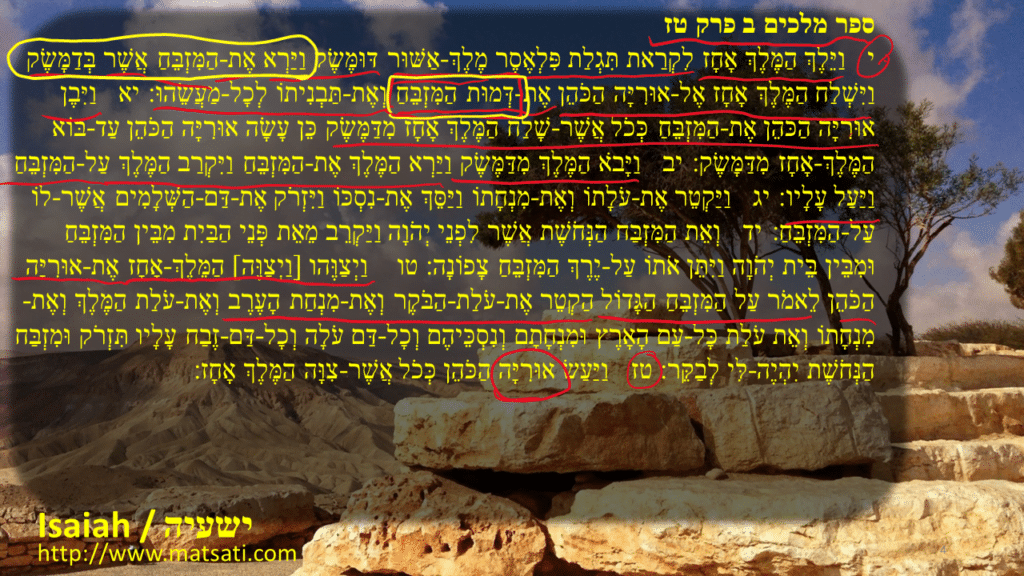
ספר מלכים ב פרק טז
י וַיֵּלֶךְ הַמֶּלֶךְ אָחָז לִקְרַאת תִּגְלַת פִּלְאֶסֶר מֶלֶךְ-אַשּׁוּר דּוּמֶּשֶֹק וַיַּרְא אֶת-הַמִּזְבֵּחַ אֲשֶׁר בְּדַמָּשֶֹק וַיִּשְׁלַח הַמֶּלֶךְ אָחָז אֶל-אוּרִיָּה הַכֹּהֵן אֶת-דְּמוּת הַמִּזְבֵּחַ וְאֶת-תַּבְנִיתוֹ לְכָל-מַעֲשֵֹהוּ: יא וַיִּבֶן אוּרִיָּה הַכֹּהֵן אֶת-הַמִּזְבֵּחַ כְּכֹל אֲשֶׁר-שָׁלַח הַמֶּלֶךְ אָחָז מִדַּמֶּשֶֹק כֵּן עָשָֹה אוּרִיָּה הַכֹּהֵן עַד-בּוֹא הַמֶּלֶךְ-אָחָז מִדַּמָּשֶֹק: יב וַיָּבֹא הַמֶּלֶךְ מִדַּמֶּשֶֹק וַיַּרְא הַמֶּלֶךְ אֶת-הַמִּזְבֵּחַ וַיִּקְרַב הַמֶּלֶךְ עַל-הַמִּזְבֵּחַ וַיַּעַל עָלָיו: יג וַיַּקְטֵר אֶת-עֹלָתוֹ וְאֶת-מִנְחָתוֹ וַיַּסֵּךְ אֶת-נִסְכּוֹ וַיִּזְרֹק אֶת-דַּם-הַשְּׁלָמִים אֲשֶׁר-לוֹ עַל-הַמִּזְבֵּחַ: יד וְאֵת הַמִּזְבַּח הַנְּחֹשֶׁת אֲשֶׁר לִפְנֵי יְהֹוָה וַיַּקְרֵב מֵאֵת פְּנֵי הַבַּיִת מִבֵּין הַמִּזְבֵּחַ וּמִבֵּין בֵּית יְהֹוָה וַיִּתֵּן אֹתוֹ עַל-יֶרֶךְ הַמִּזְבֵּחַ צָפוֹנָה: טו וַיְצַוֶּהו [וַיְצַוֶּה] הַמֶּלֶךְ-אָחָז אֶת-אוּרִיָּה הַכֹּהֵן לֵאמֹר עַל הַמִּזְבֵּחַ הַגָּדוֹל הַקְטֵר אֶת-עֹלַת-הַבֹּקֶר וְאֶת-מִנְחַת הָעֶרֶב וְאֶת-עֹלַת הַמֶּלֶךְ וְאֶת-מִנְחָתוֹ וְאֵת עֹלַת כָּל-עַם הָאָרֶץ וּמִנְחָתָם וְנִסְכֵּיהֶם וְכָל-דַּם עֹלָה וְכָל-דַּם-זֶבַח עָלָיו תִּזְרֹק וּמִזְבַּח הַנְּחֹשֶׁת יִהְיֶה-לִּי לְבַקֵּר: טז וַיַּעַשֹ אוּרִיָּה הַכֹּהֵן כְּכֹל אֲשֶׁר-צִוָּה הַמֶּלֶךְ אָחָז:
2 Kings 16:10-16
16:10 And king Ahaz went to Damascus to meet Tiglathpileser king of Assyria, and saw an altar that was at Damascus: and king Ahaz sent to Urijah the priest the fashion of the altar, and the pattern of it, according to all the workmanship thereof. 16:11 And Urijah the priest built an altar according to all that king Ahaz had sent from Damascus: so Urijah the priest made it against king Ahaz came from Damascus. 16:12 And when the king was come from Damascus, the king saw the altar: and the king approached to the altar, and offered thereon. 16:13 And he burnt his burnt offering and his meat offering, and poured his drink offering, and sprinkled the blood of his peace offerings, upon the altar. 16:14 And he brought also the brasen altar, which was before the LORD, from the forefront of the house, from between the altar and the house of the LORD, and put it on the north side of the altar. 16:15 And king Ahaz commanded Urijah the priest, saying, Upon the great altar burn the morning burnt offering, and the evening meat offering, and the king’s burnt sacrifice, and his meat offering, with the burnt offering of all the people of the land, and their meat offering, and their drink offerings; and sprinkle upon it all the blood of the burnt offering, and all the blood of the sacrifice: and the brasen altar shall be for me to enquire by. 16:16 Thus did Urijah the priest, according to all that king Ahaz commanded. (KJV)
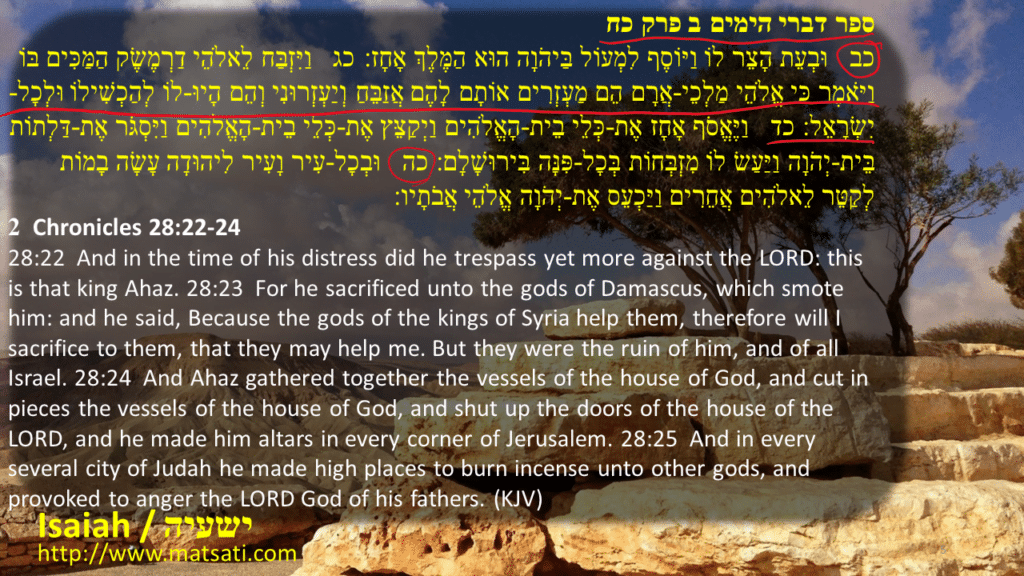
ספר דברי הימים ב פרק כח
כב וּבְעֵת הָצֵר לוֹ וַיּוֹסֶף לִמְעוֹל בַּיהֹוָה הוּא הַמֶּלֶךְ אָחָז: כג וַיִּזְבַּח לֵאלֹהֵי דַרְמֶשֶֹק הַמַּכִּים בּוֹ וַיֹּאמֶר כִּי אֱלֹהֵי מַלְכֵי-אֲרָם הֵם מַעְזְרִים אוֹתָם לָהֶם אֲזַבֵּחַ וְיַעְזְרוּנִי וְהֵם הָיוּ-לוֹ לְהַכְשִׁילוֹ וּלְכָל-יִשְֹרָאֵל: כד וַיֶּאֱסֹף אָחָז אֶת-כְּלֵי בֵית-הָאֱלֹהִים וַיְקַצֵּץ אֶת-כְּלֵי בֵית-הָאֱלֹהִים וַיִּסְגֹּר אֶת-דַּלְתוֹת בֵּית-יְהֹוָה וַיַּעַשֹ לוֹ מִזְבְּחוֹת בְּכָל-פִּנָּה בִּירוּשָׁלָם: כה וּבְכָל-עִיר וָעִיר לִיהוּדָה עָשָֹה בָמוֹת לְקַטֵּר לֵאלֹהִים אֲחֵרִים וַיַּכְעֵס אֶת-יְהֹוָה אֱלֹהֵי אֲבֹתָיו:
2 Chronicles 28:22-24
28:22 And in the time of his distress did he trespass yet more against the LORD: this is that king Ahaz. 28:23 For he sacrificed unto the gods of Damascus, which smote him: and he said, Because the gods of the kings of Syria help them, therefore will I sacrifice to them, that they may help me. But they were the ruin of him, and of all Israel. 28:24 And Ahaz gathered together the vessels of the house of God, and cut in pieces the vessels of the house of God, and shut up the doors of the house of the LORD, and he made him altars in every corner of Jerusalem. 28:25 And in every several city of Judah he made high places to burn incense unto other gods, and provoked to anger the LORD God of his fathers. (KJV)
Remember what is being drawn into the discussion here from 2 Kings 16:10-16 and 2 Chronicles 28:22-25 from a Torah perspective, specifically from Parashat Yitro. (see Shemot / Exodus 20:21-23) Here we read “in every place that my name is remembered, I will come and bless you” (בְּקָרֶךָ בְּכָל-הַמָּקוֹם אֲשֶׁר אַזְכִּיר אֶת-שְׁמִי אָבוֹא אֵלֶיךָ וּבֵרַכְתִּיךָ). The altar of God is connected to remembering the Lord God Almighty. The significance of this is in regard to what we have been studying from Isaiah so far, of the people neglecting God’s word and rejecting God’s ways, forgetting about the Lord and walking in pride and sinful lifestyles. In addition to this, Moshe writes the following saying, וְאִם-מִזְבַּח אֲבָנִים תַּעֲשֶֹה-לִּי לֹא-תִבְנֶה אֶתְהֶן גָּזִית כִּי חַרְבְּךָ הֵנַפְתָּ עָלֶיהָ וַתְּחַלְלֶהָ “If you make an altar of stone for Me, you shall not build it of cut stones, for if you wield your tool on it, you will profane it.” (NASB) This mitzvah is very important and teaches us that man is not supposed to have a design for God’s altar using the imagination of his heart. This suggests to us that God wants an altar built according to His design and not man’s design. These things reveal to us that we are not to change the Torah command, to modify what God has established for our salvation. This is related to the covenant of God and is a serious temptation and the result is profaning (וַתְּחַלְלֶהָ) the Name of the Lord. History bears out how Ahaz sinned which led to his redesigning the temple of God according to the ways of the nations. Ahaz did this as a way of demonstrating his commitment to Assyria, which he chose to join with as opposed to trusting in the Lord. This is the whole purpose of God sending Isaiah to Ahaz because as a leader of the people he was leading Judah and Jerusalem into false worship which will lead to their eventual doom and destruction.
ספר ישעיה פרק ז
ב וַיֻּגַּ֗ד לְבֵ֤ית דָּוִד֙ לֵאמֹ֔ר נָ֥חָֽה אֲרָ֖ם עַל־אֶפְרָ֑יִם וַיָּ֤נַע לְבָבוֹ֙ וּלְבַ֣ב עַמּ֔וֹ כְּנ֥וֹעַ עֲצֵי־יַ֖עַר מִפְּנֵי־רֽוּחַ׃
Isaiah 7:2 states, “And it was told the house of David, saying, (וַיֻּגַּ֗ד לְבֵ֤ית דָּוִד֙ לֵאמֹ֔ר) Syria is confederate with Ephraim. (נָ֥חָֽה אֲרָ֖ם עַל־אֶפְרָ֑יִם) And his heart was moved, and the heart of his people, (וַיָּ֤נַע לְבָבוֹ֙ וּלְבַ֣ב עַמּ֔וֹ) as the trees of the wood are moved with the wind. (כְּנ֥וֹעַ עֲצֵי־יַ֖עַר מִפְּנֵי־רֽוּחַ)” We note the phrase וַיֻּגַּ֗ד לְבֵ֤ית דָּוִד֙ לֵאמֹ֔ר “And it was told the house of David” speaks to the line of succession from David to the current king belonging to the same royal family. Both Syria (אֲרָ֖ם) and Ephraim (אֶפְרָ֑יִם) are in league together moving against Jerusalem. Then the statement וַיָּ֤נַע לְבָבוֹ֙ וּלְבַ֣ב עַמּ֔וֹ כְּנ֥וֹעַ עֲצֵי־יַ֖עַר מִפְּנֵי־רֽוּחַ “and his heart was moved, and the heart of his people, as the trees of the wood are moved with the wind” refer to everyone’s heart being moved and frightened. This is reminiscent of Ephesians 4:14 of the people being tossed about by every wind of doctrine due to their not trusting and seeking the Lord. The God of Israel makes his people stable, and not unstable to walk contrary to His commands. Illustrated in the shaken trees and leaves. In addition, the attacks of Edom and the Philistines probably add to the terror (2 Chronicles 28:17-18).
ספר ישעיה פרק ז
ג וַיֹּ֣אמֶר יְהוָה֮ אֶֽל־יְשַׁעְיָהוּ֒ צֵא־נָא֙ לִקְרַ֣את אָחָ֔ז אַתָּ֕ה וּשְׁאָ֖ר יָשׁ֣וּב בְּנֶ֑ךָ אֶל־קְצֵ֗ה תְּעָלַת֙ הַבְּרֵכָ֣ה הָעֶלְיוֹנָ֔ה אֶל־מְסִלַּ֖ת שְׂדֵ֥ה כוֹבֵֽס׃
Isaiah 7:3 states, “Then said the Lord unto Isaiah, (וַיֹּ֣אמֶר יְהוָה֮ אֶֽל־יְשַׁעְיָהוּ֒) Go forth now to meet Ahaz, (צֵא־נָא֙ לִקְרַ֣את אָחָ֔ז) thou, and Shearjashub thy son, (אַתָּ֕ה וּשְׁאָ֖ר יָשׁ֣וּב בְּנֶ֑ךָ) at the end of the conduit of the upper pool in the highway of the fuller’s field; (אֶל־קְצֵ֗ה תְּעָלַת֙ הַבְּרֵכָ֣ה הָעֶלְיוֹנָ֔ה אֶל־מְסִלַּ֖ת שְׂדֵ֥ה כוֹבֵֽס)” Ahaz must have been inspecting the water system for the city and the Lord told him to go and meet Ahaz. It is interesting Isaiah’s son’s name וּשְׁאָ֖ר יָשׁ֣וּב means “a remnant will return” may be reminiscent of the call of the people to return to God’s word. What exactly was the purpose of God telling Isaiah and his son to go to Ahaz? What was the point וּשְׁאָ֖ר יָשׁ֣וּב presence? Maybe a subtle message to Ahaz concerning the destruction of Judah and Jerusalem, that only a remnant of people would be left? Or maybe that there is only a remnant of people who have remained faithful, and that he (Ahaz) needs to recognize this and turn from his evil ways.
ספר ישעיה פרק ז
ד וְאָמַרְתָּ֣ אֵ֠לָיו הִשָּׁמֵ֨ר וְהַשְׁקֵ֜ט אַל־תִּירָ֗א וּלְבָבְךָ֙ אַל־יֵרַ֔ךְ מִשְּׁנֵ֨י זַנְב֧וֹת הָאוּדִ֛ים הָעֲשֵׁנִ֖ים הָאֵ֑לֶּה בָּחֳרִי־אַ֛ף רְצִ֥ין וַאֲרָ֖ם וּבֶן־רְמַלְיָֽהוּ׃ ה יַ֗עַן כִּֽי־יָעַ֥ץ עָלֶ֛יךָ אֲרָ֖ם רָעָ֑ה אֶפְרַ֥יִם וּבֶן־רְמַלְיָ֖הוּ לֵאמֹֽר׃ ו נַעֲלֶ֤ה בִֽיהוּדָה֙ וּנְקִיצֶ֔נָּה וְנַבְקִעֶ֖נָּה אֵלֵ֑ינוּ וְנַמְלִ֥יךְ מֶ֙לֶךְ֙ בְּתוֹכָ֔הּ אֵ֖ת בֶּן־טָֽבְאַֽל׃
Isaiah 7:4 states, “And say unto him, (וְאָמַרְתָּ֣ אֵ֠לָיו) Take heed, and be quiet; fear not, (הִשָּׁמֵ֨ר וְהַשְׁקֵ֜ט אַל־תִּירָ֗א) neither be fainthearted for the two tails of these smoking firebrands, (וּלְבָבְךָ֙ אַל־יֵרַ֔ךְ מִשְּׁנֵ֨י זַנְב֧וֹת הָאוּדִ֛ים הָעֲשֵׁנִ֖ים) for the fierce anger of Rezin with Syria, and of the son of Remaliah. (הָאֵ֑לֶּה בָּחֳרִי־אַ֛ף רְצִ֥ין וַאֲרָ֖ם וּבֶן־רְמַלְיָֽהוּ)” Isaiah 7:5 “Because Syria, Ephraim, and the son of Remaliah, have taken evil counsel against thee, saying, (יַ֗עַן כִּֽי־יָעַ֥ץ עָלֶ֛יךָ אֲרָ֖ם רָעָ֑ה אֶפְרַ֥יִם וּבֶן־רְמַלְיָ֖הוּ לֵאמֹֽר)” Isaiah 7:6 “Let us go up against Judah, and vex it, (נַעֲלֶ֤ה בִֽיהוּדָה֙ וּנְקִיצֶ֔נָּה) and let us make a breach therein for us, (וְנַבְקִעֶ֖נָּה אֵלֵ֑ינוּ) and set a king in the midst of it, even the son of Tabeal: (וְנַמְלִ֥יךְ מֶ֙לֶךְ֙ בְּתוֹכָ֔הּ אֵ֖ת בֶּן־טָֽבְאַֽל)” God tells Isaiah to call Rezin and Remaliah two tails of smoking firebrands. These two people are allies in a war against Judah and Jerusalem, and the imagery of the firebrands (הָאוּדִ֛ים) which are wooden pokers that one uses to stir a fire, when pulling the poker out of the heat the end of the wooden stick keeps burning a little and smoke comes off the end of the stick. The firesticks are not able to start additional fires as the fire is not firmly set in the wood of the poker. This metaphor suggests that Ahaz is not supposed to fear these kings. It may be that Tiglath-pileser was already on his way or that these two kings had heard that he was coming. Remember that the King of Assyria was invited by Ahaz king of Judah to aid him against the kings of Syria and Israel. (see 2 Kings 16:7-10) This is surprising as we read according to 2 Kings 15:29 In the days of Pekah king of Israel came Tiglath-pileser king of Assyria, and took Ijon, and Abel-beth-maacah, and Janoah, and Kedesh, and Hazor, and Gilead, and Galilee, all the land of Naphtali; and he carried them captive to Assyria. (JPS) It seems strange that Ahaz would ask the aid of a king who had conquered his brothers? The reason may be that Ephraim was in league with Rezin and so making an enemy your friend may be at work here, but Tiglath-pileser exacted a heavy cost in gold and silver for his help which did not amount to much. Syria, Ephraim, and the son of Remaliah had evil plans to take Judah and Jerusalem and set up a king of their own in this place. We note that this new king would be working for them with whom they could manipulate and exact annual tribute from the people. Note Isaiah’s words remind us of the Torah.
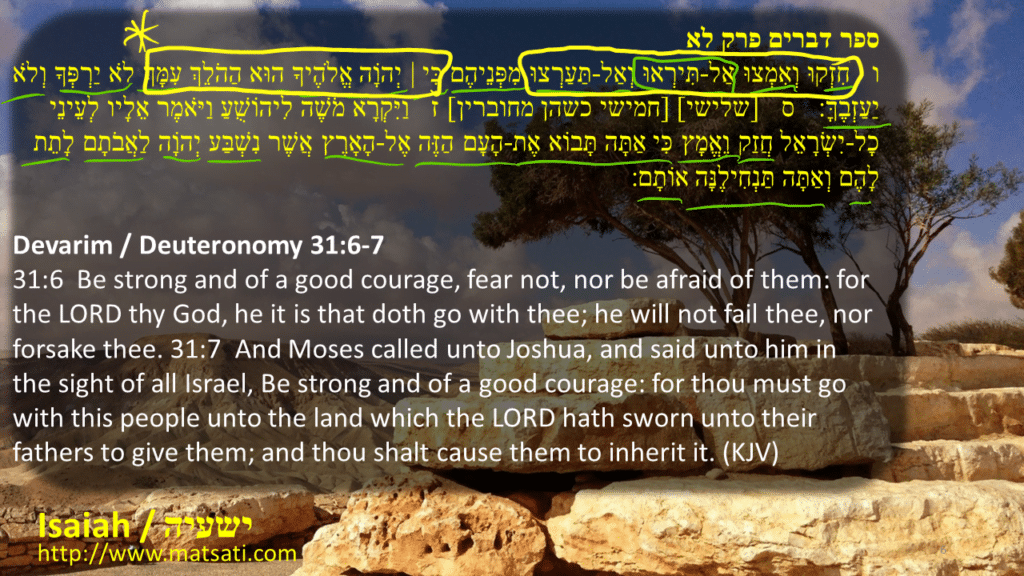
ספר דברים פרק לא
ו חִזְקוּ וְאִמְצוּ אַל-תִּירְאוּ וְאַל-תַּעַרְצוּ מִפְּנֵיהֶם כִּי | יְהוָֹה אֱלֹהֶיךָ הוּא הַהֹלֵךְ עִמָּךְ לֹא יַרְפְּךָ וְלֹא יַעַזְבֶךָּ: ס [שלישי] [חמישי כשהן מחוברין] ז וַיִּקְרָא מֹשֶׁה לִיהוֹשֻׁעַ וַיֹּאמֶר אֵלָיו לְעֵינֵי כָל-יִשְֹרָאֵל חֲזַק וֶאֱמָץ כִּי אַתָּה תָּבוֹא אֶת-הָעָם הַזֶּה אֶל-הָאָרֶץ אֲשֶׁר נִשְׁבַּע יְהוָֹה לַאֲבֹתָם לָתֵת לָהֶם וְאַתָּה תַּנְחִילֶנָּה אוֹתָם:
Devarim / Deuteronomy 31:6-7
31:6 Be strong and of a good courage, fear not, nor be afraid of them: for the LORD thy God, he it is that doth go with thee; he will not fail thee, nor forsake thee. 31:7 And Moses called unto Joshua, and said unto him in the sight of all Israel, Be strong and of a good courage: for thou must go with this people unto the land which the LORD hath sworn unto their fathers to give them; and thou shalt cause them to inherit it. (KJV)
ספר יהושע פרק א
ו חֲזַק וֶאֱמָץ כִּי אַתָּה תַּנְחִיל אֶת-הָעָם הַזֶּה אֶת-הָאָרֶץ אֲשֶׁר-נִשְׁבַּעְתִּי לַאֲבוֹתָם לָתֵת לָהֶם: ז רַק חֲזַק וֶאֱמַץ מְאֹד לִשְׁמֹר לַעֲשֹוֹת כְּכָל-הַתּוֹרָה אֲשֶׁר צִוְּךָ מֹשֶׁה עַבְדִּי אַל-תָּסוּר מִמֶּנּוּ יָמִין וּשְֹמֹאול לְמַעַן תַּשְֹכִּיל בְּכֹל אֲשֶׁר תֵּלֵךְ: ח לֹא-יָמוּשׁ סֵפֶר הַתּוֹרָה הַזֶּה מִפִּיךָ וְהָגִיתָ בּוֹ יוֹמָם וָלַיְלָה לְמַעַן תִּשְׁמֹר לַעֲשֹוֹת כְּכָל-הַכָּתוּב בּוֹ כִּי-אָז תַּצְלִיחַ אֶת-דְּרָכֶךָ וְאָז תַּשְֹכִּיל: ט הֲלוֹא צִוִּיתִיךָ חֲזַק וֶאֱמָץ אַל-תַּעֲרֹץ וְאַל-תֵּחָת כִּי עִמְּךָ יְהֹוָה אֱלֹהֶיךָ בְּכֹל אֲשֶׁר תֵּלֵךְ:
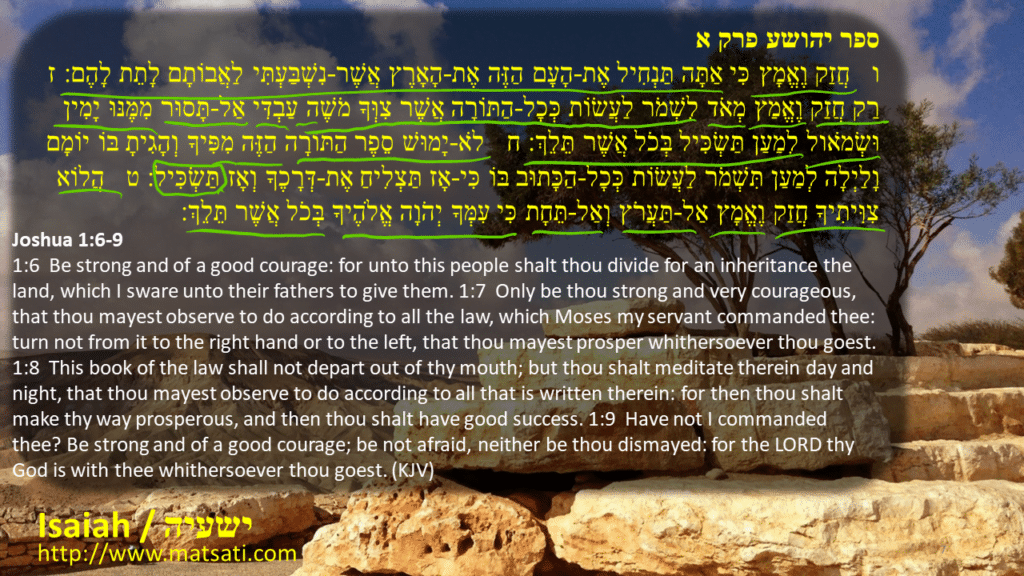
Joshua 1:6-9
1:6 Be strong and of a good courage: for unto this people shalt thou divide for an inheritance the land, which I sware unto their fathers to give them. 1:7 Only be thou strong and very courageous, that thou mayest observe to do according to all the law, which Moses my servant commanded thee: turn not from it to the right hand or to the left, that thou mayest prosper whithersoever thou goest. 1:8 This book of the law shall not depart out of thy mouth; but thou shalt meditate therein day and night, that thou mayest observe to do according to all that is written therein: for then thou shalt make thy way prosperous, and then thou shalt have good success. 1:9 Have not I commanded thee? Be strong and of a good courage; be not afraid, neither be thou dismayed: for the LORD thy God is with thee whithersoever thou goest. (KJV)
These words חִזְקוּ וְאִמְצוּ אַל-תִּירְאוּ וְאַל-תַּעַרְצוּ מִפְּנֵיהֶם “be courageous and be strong, do not fear and do not tremble” from the Torah are words of encouragement similar to what we are reading God telling Isaiah to tell Ahaz. The point being drawn from the Torah perspective is that the source of encouragement and strength comes from the Lord, and specifically because of God going before us into battle. Being aware of these things brings faith and courage, which is an important point for our studying God’s holy Word. When God is on our side, nothing is impossible, because we know how much the Lord loves us.
ספר יהושע פרק א
ז כֹּ֥ה אָמַ֖ר אֲדֹנָ֣י יְהוִ֑ה לֹ֥א תָק֖וּם וְלֹ֥א תִֽהְיֶֽה׃ ח כִּ֣י רֹ֤אשׁ אֲרָם֙ דַּמֶּ֔שֶׂק וְרֹ֥אשׁ דַּמֶּ֖שֶׂק רְצִ֑ין וּבְע֗וֹד שִׁשִּׁ֤ים וְחָמֵשׁ֙ שָׁנָ֔ה יֵחַ֥ת אֶפְרַ֖יִם מֵעָֽם׃ ט וְרֹ֤אשׁ אֶפְרַ֙יִם֙ שֹׁמְר֔וֹן וְרֹ֥אשׁ שֹׁמְר֖וֹן בֶּן־רְמַלְיָ֑הוּ אִ֚ם לֹ֣א תַאֲמִ֔ינוּ כִּ֖י לֹ֥א תֵאָמֵֽנוּ׃
Isaiah 7:7 states, “Thus saith the Lord God, (כֹּ֥ה אָמַ֖ר אֲדֹנָ֣י יְהוִ֑ה) It shall not stand, neither shall it come to pass. (לֹ֥א תָק֖וּם וְלֹ֥א תִֽהְיֶֽה)” Isaiah 7:8 “For the head of Syria is Damascus, (כִּ֣י רֹ֤אשׁ אֲרָם֙ דַּמֶּ֔שֶׂק) and the head of Damascus is Rezin; (וְרֹ֥אשׁ דַּמֶּ֖שֶׂק רְצִ֑ין) and within threescore and five years shall Ephraim be broken, that it be not a people. (וּבְע֗וֹד שִׁשִּׁ֤ים וְחָמֵשׁ֙ שָׁנָ֔ה יֵחַ֥ת אֶפְרַ֖יִם מֵעָֽם)” Isaiah 7:9 “And the head of Ephraim is Samaria, (וְרֹ֤אשׁ אֶפְרַ֙יִם֙ שֹׁמְר֔וֹן) and the head of Samaria is Remaliah’s son. (וְרֹ֥אשׁ שֹׁמְר֖וֹן בֶּן־רְמַלְיָ֑הוּ) If ye will not believe, surely ye shall not be established. (אִ֚ם לֹ֣א תַאֲמִ֔ינוּ כִּ֖י לֹ֥א תֵאָמֵֽנוּ)” The Lord declares that this will not stand. This is again a reference to the Torah. Take for example if we consider the root word for “righteous” (צדק) which means to walk a straight line. With this root word צדק it is possible to derive the word צדיק which means “righteous one” and this is one who walks a straight line, who is upright, an analogy to one who is able to stand. Note that if we listen and obey, we are told the following according to the Torah, the prophets, and the NT.
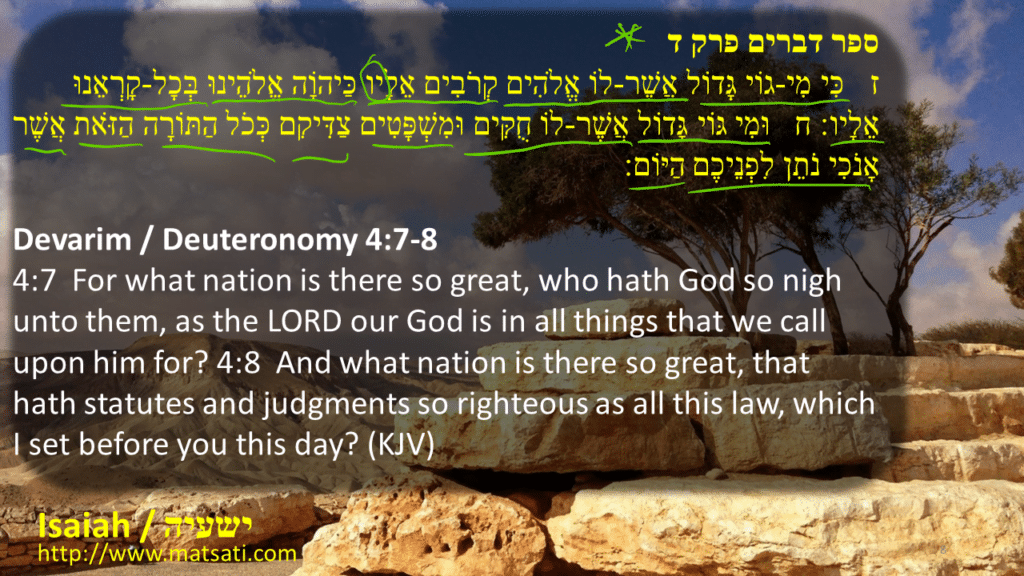
ספר דברים פרק ד
ז כִּי מִי-גוֹי גָּדוֹל אֲשֶׁר-לוֹ אֱלֹהִים קְרֹבִים אֵלָיו כַּיהוָֹה אֱלֹהֵינוּ בְּכָל-קָרְאֵנוּ אֵלָיו: ח וּמִי גּוֹי גָּדוֹל אֲשֶׁר-לוֹ חֻקִּים וּמִשְׁפָּטִים צַדִּיקִם כְּכֹל הַתּוֹרָה הַזֹּאת אֲשֶׁר אָנֹכִי נֹתֵן לִפְנֵיכֶם הַיּוֹם:
Devarim / Deuteronomy 4:7-8
4:7 For what nation is there so great, who hath God so nigh unto them, as the LORD our God is in all things that we call upon him for? 4:8 And what nation is there so great, that hath statutes and judgments so righteous as all this law, which I set before you this day? (KJV)
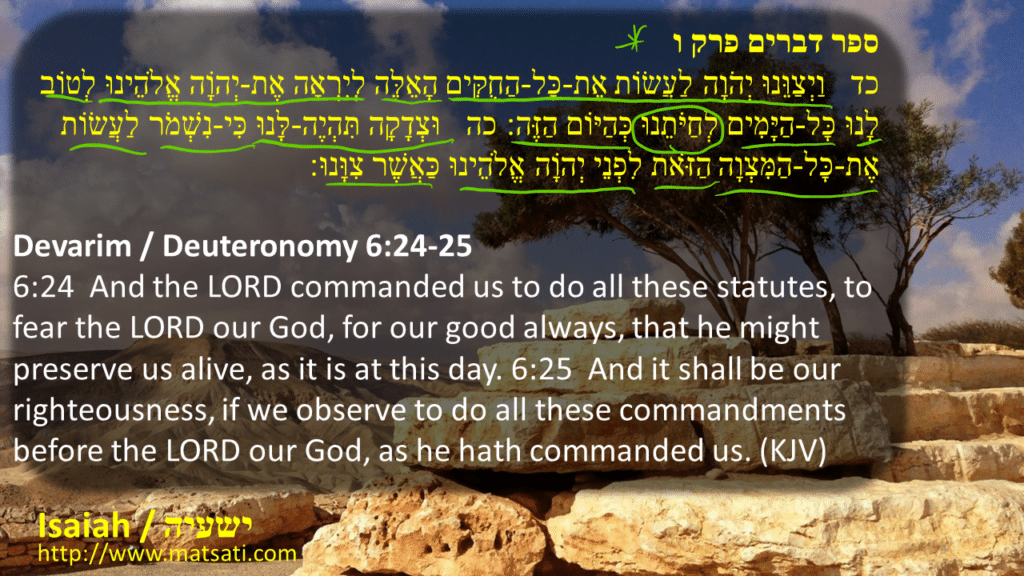
ספר דברים פרק ו
כד וַיְצַוֵּנוּ יְהֹוָה לַעֲשֹוֹת אֶת-כָּל-הַחֻקִּים הָאֵלֶּה לְיִרְאָה אֶת-יְהוָֹה אֱלֹהֵינוּ לְטוֹב לָנוּ כָּל-הַיָּמִים לְחַיֹּתֵנוּ כְּהַיּוֹם הַזֶּה: כה וּצְדָקָה תִּהְיֶה-לָּנוּ כִּי-נִשְׁמֹר לַעֲשֹוֹת אֶת-כָּל-הַמִּצְוָה הַזֹּאת לִפְנֵי יְהוָֹה אֱלֹהֵינוּ כַּאֲשֶׁר צִוָּנוּ:
Devarim / Deuteronomy 6:24-25
6:24 And the LORD commanded us to do all these statutes, to fear the LORD our God, for our good always, that he might preserve us alive, as it is at this day. 6:25 And it shall be our righteousness, if we observe to do all these commandments before the LORD our God, as he hath commanded us. (KJV)
We note the point of these commands, the צדיק is the one who walks a straight line, a righteous one, those who live by the commands of God will receive the righteousness of God. This was so important for our lives the prophet Malachi states the following saying:
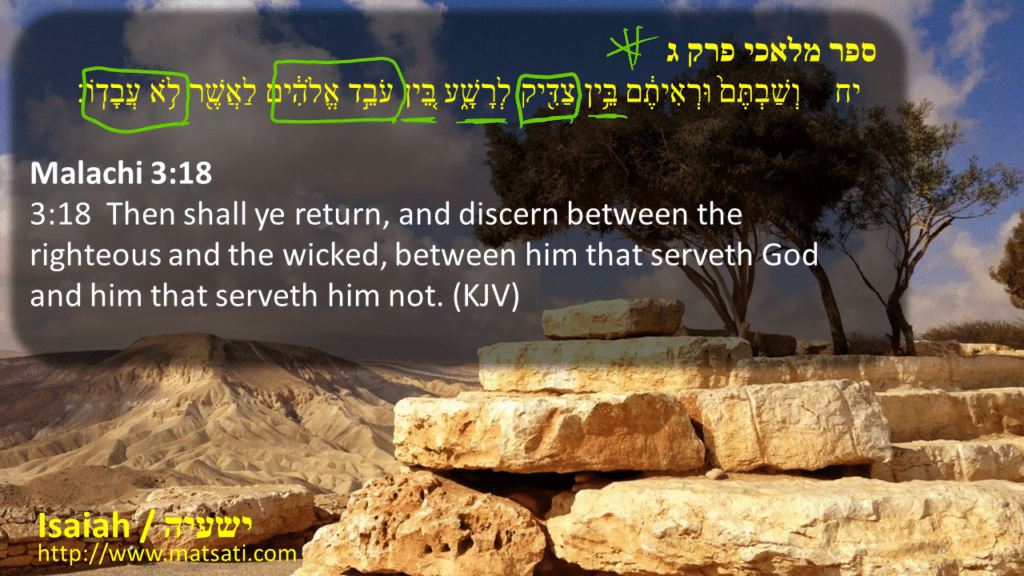
ספר מלאכי פרק ג
וְשַׁבְתֶּם֙ וּרְאִיתֶ֔ם בֵּ֥ין צַדִּ֖יק לְרָשָׁ֑ע בֵּ֚ין עֹבֵ֣ד אֱלֹהִ֔ים לַאֲשֶׁ֖ר לֹ֥א עֲבָדֽוֹ׃
Malachi 3:18
3:18 Then shall ye return, and discern between the righteous and the wicked, between him that serveth God and him that serveth him not. (KJV)
This again is a Torah command that we are to make the distinction from good and evil, from righteousness and unrighteousness. These truths come from the creation account as God in the first of his creation separated the light from the darkness. Paul also states in the New Covenant that righteousness comes from obedience to the Torah.
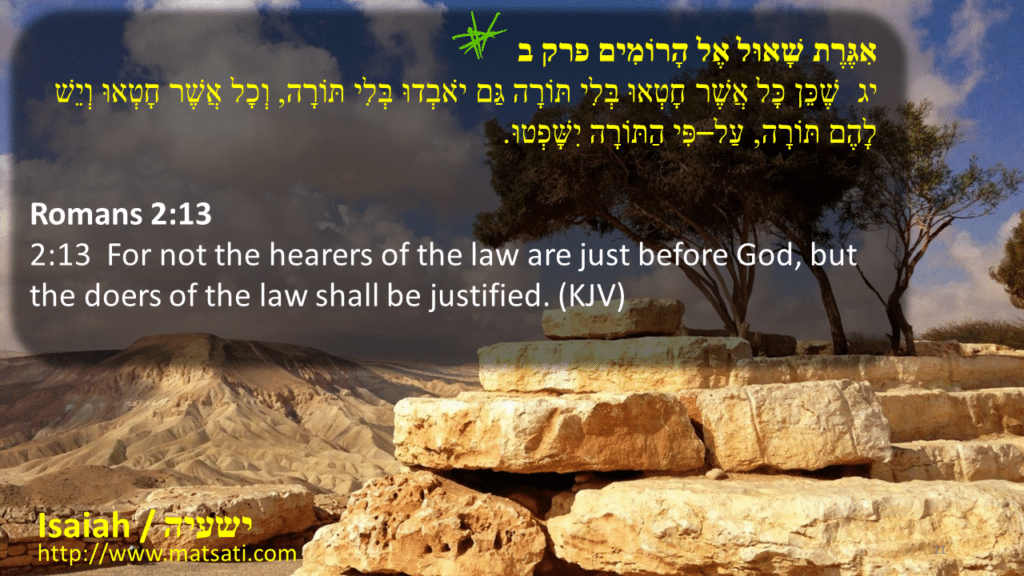
אִגֶּרֶת שָׁאוּל אֶל הָרוֹמִים פרק ב
יג הֲרֵי לֹא שׁוֹמְעֵי הַתּוֹרָה צַדִּיקִים לִפְנֵי אֱלֹהִים, אֶלָּא הַמְקַיְּמִים אֶת הַתּוֹרָה הֵם אֲשֶׁר יֻצְדְּקוּ
Romans 2:13
2:13 For not the hearers of the law are just before God, but the doers of the law shall be justified. (KJV)
Paul writes that it is not simply those who hear the Torah who are righteous in God’s sight, but those who obey the Torah who will be declared righteous. This is what the Apostle John wrote according to 1 John 3:7 saying “Dear children, do not let anyone lead you astray. He who does what is right is righteous.” This is what it means to stand or not to stand before God. The nations will not stand before a holy and righteous God. The צדיק figuratively and literally means that one is to do what is right, this is a way of life, a way of living, a way of walking before God. The Torah is a straight line and teaches God’s children how to walk a straight line and this is why God’s prophets always called the people back to the holy and righteous ways of the Lord. This is also how we understand the NT text, again the Torah is the “straight line” by which God’s children are to walk and Yeshua the Messiah demonstrated for us exactly how to do this!
The Lord announces to Ahaz through Isaiah that this plan of these two men / kings will not succeed. This is something Ahaz was to take by “faith,” something he was lacking in significantly. Isaiah 7:7-8 speaks of Ephraim and Syria and the leaders who lead their people astray. Note that Ahaz was required to exercise faith, which is a natural requirement for any prophetic message. This message of God which needs the exercising of faith, this indicates that Ahaz needs to make God sovereign in his life, to trust in him, and to take hold of the covenant, and trust in the one who is able to keep him! It is only by trusting in the Lord God of Israel that he would be able to have peace and security.
ספר יהושע פרק א
י וַיּ֣וֹסֶף יְהוָ֔ה דַּבֵּ֥ר אֶל־אָחָ֖ז לֵאמֹֽר׃
Isaiah 7:10 “Moreover the Lord spake again unto Ahaz, saying, (וַיּ֣וֹסֶף יְהוָ֔ה דַּבֵּ֥ר אֶל־אָחָ֖ז לֵאמֹֽר)” So the Lord continues to speak to Ahaz and this time He puts Ahaz to the test. Could it be that Ahaz was simply going to offer Isaiah and God lip service? So the Lord asks him to ask for a sign according to Isaiah 7:11.
ספר יהושע פרק א
יא שְׁאַל־לְךָ֣ א֔וֹת מֵעִ֖ם יְהוָ֣ה אֱלֹהֶ֑יךָ הַעְמֵ֣ק שְׁאָ֔לָה א֖וֹ הַגְבֵּ֥הַּ לְמָֽעְלָה׃ יב וַיֹּ֖אמֶר אָחָ֑ז לֹא־אֶשְׁאַ֥ל וְלֹֽא־אֲנַסֶּ֖ה אֶת־יְהוָֽה׃
Isaiah 7:11 “Ask thee a sign of the Lord thy God; (שְׁאַל־לְךָ֣ א֔וֹת מֵעִ֖ם יְהוָ֣ה אֱלֹהֶ֑יךָ) ask it either in the depth, or in the height above. (הַעְמֵ֣ק שְׁאָ֔לָה א֖וֹ הַגְבֵּ֥הַּ לְמָֽעְלָה)” Isaiah Isaiah 7:12 “But Ahaz said, (וַיֹּ֖אמֶר אָחָ֑ז) I will not ask, neither will I tempt the Lord. (לֹא־אֶשְׁאַ֥ל וְלֹֽא־אֲנַסֶּ֖ה אֶת־יְהוָֽה)” We had noted earlier that signs and wonders do not elicit faith inside of someone’s heart. The Lord God Almighty however has revealed Himself to His people through powerful deliverances, just as He brought a nation from the midst of another nation. (Devarim / Deuteronomy 4:34) It is in the words of the Scriptures that our faith is built, and that the Lord God Almighty expects us to have faith. We note Moshe says, כִּֽי־תִשְׁמַ֞ע אֶל־מִצְוֺ֣ת׀ יְהוָ֣ה אֱלֹהֶ֗יךָ אֲשֶׁ֨ר אָנֹכִ֧י מְצַוְּךָ֛ הַיּ֖וֹם לִשְׁמֹ֥ר וְלַעֲשֽׂוֹת׃ “if that thou hearken unto the commandments of the LORD thy God, which I command thee this day, to observe and to do them” speaks to our first stepping out in faith, this doesn’t mean that we do not have a rational foundation, but that we have something to believe in that is true. The Scriptures are the foundation of our faith, and we can trust and believe that the Lord will work in our lives if we ask. This is the point that Moshe is making according to Devarim / Deuteronomy 6:22, וַיִּתֵּ֣ן יְהוָ֡ה אוֹתֹ֣ת וּ֠מֹפְתִים גְּדֹלִ֨ים וְרָעִ֧ים׀ בְּמִצְרַ֛יִם בְּפַרְעֹ֥ה וּבְכָל־בֵּית֖וֹ לְעֵינֵֽינוּ “And the LORD shewed signs and wonders, great and sore, upon Egypt, upon Pharaoh, and upon all his household, before our eyes” the people are to believe based upon how the Lord God has already worked in their lives and to continue believing before entering into the Promised Land. When we consider what the Torah and the history of Israel reveals, Ahaz could have asked anything of the Lord. There is no limit to what the Lord God Almighty is capable of doing. Even one’s sin which appears as an insurmountable mountain will be cast into the sea if one has the faith to believe God will do this! We note that this is the God of Abraham, Isaac, and Jacob, the God of Israel that is asking this of Ahaz. Could it be that Ahaz does not know the Scriptures and what the Lord has done? There is some likelihood of this situation as Ahaz has placed his trust in Assyria to help him as opposed to the Lord God in heaven. Ahaz however would not ask for a sign and says, לֹא־אֶשְׁאַ֥ל וְלֹֽא־אֲנַסֶּ֖ה אֶת־יְהוָֽה “I will not ask, neither will I tempt the Lord” which sounds almost like he is attempting to be righteous in his words not to ask for a sign. We see there is a kind of faith that one can ask God for a sign, this is from a believing perspective (see 2 Kings 20:8-11, Malachi 3:10, and Tehillim / Psalms 34:7 / 34:6 in English trans.). The seeking of a sign from an unbelieving perspective we are told is detestable before God. (see Matthew 16:4, Mark 8:12, Luke 11:29) So the answer that Ahaz provides is not a matter of keeping the holiness of God, but has a the lack of faith to even bother to ask, believing that the Lord is not able to do what he would want. This again leads back to Ahaz having sought Assyria to help as opposed to seeking the Lord. Isaiah answers in response saying the following according to Isaiah 7:13:
ספר יהושע פרק א
יג וַיֹּ֕אמֶר שִׁמְעוּ־נָ֖א בֵּ֣ית דָּוִ֑ד הַמְעַ֤ט מִכֶּם֙ הַלְא֣וֹת אֲנָשִׁ֔ים כִּ֥י תַלְא֖וּ גַּ֥ם אֶת־אֱלֹהָֽי׃
Isaiah 7:13 “And he said, Hear ye now, O house of David; (וַיֹּ֕אמֶר שִׁמְעוּ־נָ֖א בֵּ֣ית דָּוִ֑ד) Is it a small thing for you to weary men, but will ye weary my God also? (הַמְעַ֤ט מִכֶּם֙ הַלְא֣וֹת אֲנָשִׁ֔ים כִּ֥י תַלְא֖וּ גַּ֥ם אֶת־אֱלֹהָֽי)” Of course this verse reminds us of what Isaiah wrote later on saying, “The Lord ’s arm is not too short to save, and his ear is not too deaf to hear.” (ESV, Isaiah 59:1) but more specifically, this reminds us of what God said to Moshe in the Torah according to Bamidbar / Numbers 11:23.
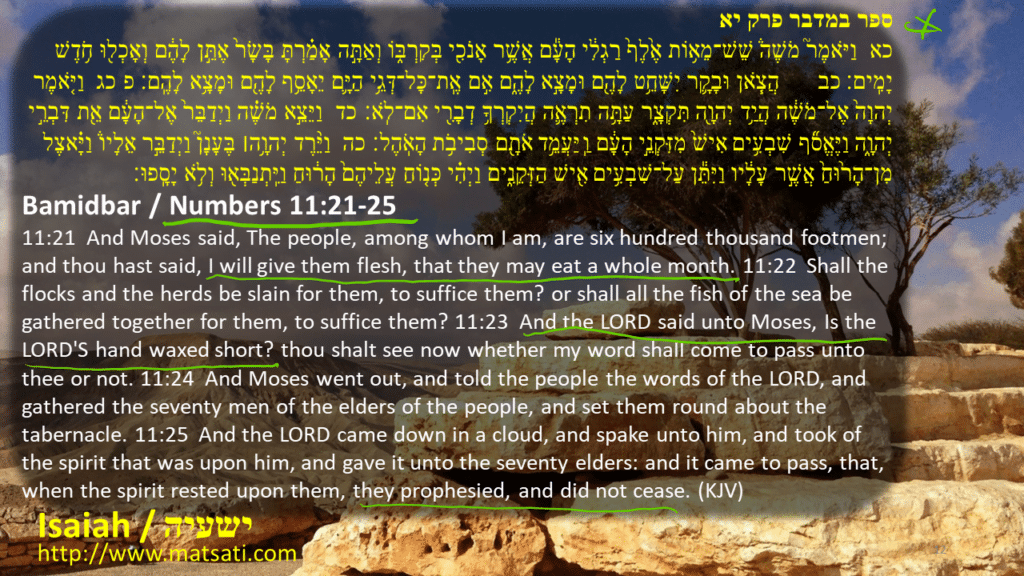
ספר במדבר פרק יא
כא וַיֹּאמֶר֮ מֹשֶׁה֒ שֵׁשׁ־מֵא֥וֹת אֶ֙לֶף֙ רַגְלִ֔י הָעָ֕ם אֲשֶׁ֥ר אָנֹכִ֖י בְּקִרְבּ֑וֹ וְאַתָּ֣ה אָמַ֗רְתָּ בָּשָׂר֙ אֶתֵּ֣ן לָהֶ֔ם וְאָכְל֖וּ חֹ֥דֶשׁ יָמִֽים׃ כב הֲצֹ֧אן וּבָקָ֛ר יִשָּׁחֵ֥ט לָהֶ֖ם וּמָצָ֣א לָהֶ֑ם אִ֣ם אֶֽת־כָּל־דְּגֵ֥י הַיָּ֛ם יֵאָסֵ֥ף לָהֶ֖ם וּמָצָ֥א לָהֶֽם׃ פ כג וַיֹּ֤אמֶר יְהוָה֙ אֶל־מֹשֶׁ֔ה הֲיַ֥ד יְהוָ֖ה תִּקְצָ֑ר עַתָּ֥ה תִרְאֶ֛ה הֲיִקְרְךָ֥ דְבָרִ֖י אִם־לֹֽא׃ כד וַיֵּצֵ֣א מֹשֶׁ֗ה וַיְדַבֵּר֙ אֶל־הָעָ֔ם אֵ֖ת דִּבְרֵ֣י יְהוָ֑ה וַיֶּאֱסֹ֞ף שִׁבְעִ֥ים אִישׁ֙ מִזִּקְנֵ֣י הָעָ֔ם וַֽיַּעֲמֵ֥ד אֹתָ֖ם סְבִיבֹ֥ת הָאֹֽהֶל׃ כה וַיֵּ֨רֶד יְהוָ֥ה׀ בֶּעָנָן֮ וַיְדַבֵּ֣ר אֵלָיו֒ וַיָּ֗אצֶל מִן־הָר֙וּחַ֙ אֲשֶׁ֣ר עָלָ֔יו וַיִּתֵּ֕ן עַל־שִׁבְעִ֥ים אִ֖ישׁ הַזְּקֵנִ֑ים וַיְהִ֗י כְּנ֤וֹחַ עֲלֵיהֶם֙ הָר֔וּחַ וַיִּֽתְנַבְּא֖וּ וְלֹ֥א יָסָֽפוּ׃
Bamidbar / Numbers 11:21-25
11:21 And Moses said, The people, among whom I am, are six hundred thousand footmen; and thou hast said, I will give them flesh, that they may eat a whole month. 11:22 Shall the flocks and the herds be slain for them, to suffice them? or shall all the fish of the sea be gathered together for them, to suffice them? 11:23 And the LORD said unto Moses, Is the LORD’S hand waxed short? thou shalt see now whether my word shall come to pass unto thee or not. 11:24 And Moses went out, and told the people the words of the LORD, and gathered the seventy men of the elders of the people, and set them round about the tabernacle. 11:25 And the LORD came down in a cloud, and spake unto him, and took of the spirit that was upon him, and gave it unto the seventy elders: and it came to pass, that, when the spirit rested upon them, they prophesied, and did not cease. (KJV)
Note that a great miracle was performed to feed all of Israel, and it was also at this time there was the giving of the Holy Spirit of God. It was within this situation that even Moshe had a lack of faith to believe, even though the people had come through the Red Sea miracle. Moshe questioned God and the Lord God said כג וַיֹּ֤אמֶר יְהוָה֙ אֶל־מֹשֶׁ֔ה הֲיַ֥ד יְהוָ֖ה תִּקְצָ֑ר עַתָּ֥ה תִרְאֶ֛ה הֲיִקְרְךָ֥ דְבָרִ֖י אִם־לֹֽא׃ 11:23 And the LORD said unto Moses, Is the LORD’S hand waxed short? thou shalt see now whether my word shall come to pass unto thee or not. (KJV) The idea is that Isaiah again draws us back to the Torah context, and to the matter of having faith, specifically to the people who believed they would die due to a lack of food, and God providing that food, bread and meat, and so much meat they wouldn’t know what to do with it all. In Ahaz’s situation, he felt he had no hope and the only hope was to trust in foreign nations and also to trust in their false gods, illustrated by his creating altars for their gods according to 2 Kings 16:10-16 and 2 Chronicles 28:22-25 violating the command of God according to Parashat Yitro. (see Shemot / Exodus 20:21-23) This is ultimately the point of Isaiah speaking of trusting in God, and in the Messianic Expectation that he provides Judah and Jerusalem throughout his book. We note that even though through the sin of man an entire nation may fall, the Lord God Almighty is not finished with David and Judah by sending His Messiah Yeshua, in fulfillment of His holy Words. We note what Isaiah says, שִׁמְעוּ־נָ֖א בֵּ֣ית דָּוִ֑ד “listen now house of David” which is pointing to the promise that God had made to David concerning the future king. Regardless of the situation, the Lord God can bring His words to completion, to become true in the sense of their fulfillment. Under the rule of Ahaz, the house of David is completely without hope. When being led by an unfaithful leader, the nation is doomed. This was the point of Isaiah’s calling to make this apparent, and to call not just the people but the leadership as well back to faith and hope in God Almighty. We note what Isaiah says in the second half of Isaiah 7:13, הַמְעַ֤ט מִכֶּם֙ הַלְא֣וֹת אֲנָשִׁ֔ים כִּ֥י תַלְא֖וּ גַּ֥ם אֶת־אֱלֹהָֽי “Is it a small thing for you to weary men, but will ye weary my God also?” The point may be that one can weary men, one can fool men, but it is impossible to fool God. Note what the TgJ states, וַאֲמַר שְׁמָעוּ כְעַן בֵּית דָוִד הַזְעֵר לְכוֹן דְאַתּוּן מְהַלָן יַת נְבִייָא אֲרֵי תְהַלוּן אַף יַת פִּתְגָמֵי אֱלָהָי: And he said, Hear ye now, O house of David; is it a small thing to you that ye are troublesome to the prophets, that ye refuse also the words of my God? (TgJ) that “men” (אֲנָשִׁ֔ים ) is a reference to “prophets” (נְבִייָא) who speaks for God or in the place of God to men. This interpretation is that it is possible to fool one who is faithful, but not to God. We note according to Isaiah 7:11 the prophet says, שְׁאַל־לְךָ֣ א֔וֹת מֵעִ֖ם יְהוָ֣ה אֱלֹהֶ֑יךָ “you ask of a sign from the Lord your God.” This suggests that God is the one who has established Ahaz, and he is supposed to recognize this. Then Isaiah switches this to הַמְעַ֤ט מִכֶּם֙ הַלְא֣וֹת אֲנָשִׁ֔ים כִּ֥י תַלְא֖וּ גַּ֥ם אֶת־אֱלֹהָֽי “Is it a small thing for you to weary men, but will ye weary my God also?” referring to אֱלֹהָֽי “my God” again suggesting that Ahaz doesn’t recognize the God of Israel, and so Isaiah is showing him how his God, the God of Israel will work in a powerful way! This same situation of switching from “your God” to “my God” also occurred in 1 Samuel 15:26-30 with King Saul. This suggests to us how we are to understand, to know, to listen, and to obey according to the pages of the Scriptures (the Bible). As God’s people we are called to study God’s word, for the purpose of knowing not just about God, but also His promises, to grow our faith, to believe, and to invite the God of Israel into our midst to be Lord over each and every one of us! All of these things speak to relationship, and to the NT accounts of God’s Messiah Yeshua who in fulfillment of the Messianic Expectations in the pages of the Scriptures, laid his life down for ours, so that we might have life, and the presence and the power of God in our lives just as the Torah proclaims!
Rabbinic Commentary on Isaiah 7:1-13
The Targum Jonathan is a rabbinic interpretation of the book of Isaiah, the Talmud places the Aramaic translation in antiquity, and thus this written text is also very important for an early understanding and interpretation of Isaiah.
תרגום יונתן בן עוזיאל אל ישעיה פרק ז:א-יג
א וַהְוָה בְיֹומֵי אָחָז בַר יֹותָם בַר עוּזִיָה מַלַך שִבטָא דְבֵית יְהוּדָה סְלֵיק רְצִין מַלכָא דַאְרָם וּפַקַח בַר רְמַליָה מַלכָא דְיִשׂרָאֵל לִירוּשְלַם לַאְגָחָא קְרָבָא עְלַה וְלָא יְכֵיל לַאְגָחָא עְלַה׃ ב וְאִתחַוַה לְבֵית דָוִיד לְמֵימַר אִתחַבַר מַלכָא דַאְרָם עִם מַלכָא דְיִשרָאֵל לְמֵיתֵי עְלֹוהִי וְזָע לִבֵיה וְלִיבָא דְעַמֵיה כְאִשתְדָיוּת אִילָנֵי חוּרשָא מִן קֳדָם רוּחָא׃ ג וַאְמַר יוי לִישַעיָה פֹוק כְעַן לְקַדָמוּת אָחָז אַת וּשאָר דְלָא חְטֹו וּדתָבוּ מֵחִטאָה תַלמִידָך לִסְיָפֵי מְזִיקַת בְרֵיכְתָא עִלִיתָא דִי בְכֵיבַש חְקַל מַשטַח קָצְרַיָא׃ ד וְתֵימַר לֵיה אִסתְמַר וְנוּח לָא תִדחַל וְלִיבָך לָא יְזוּעַ מִן קֳדָם תְרֵין מַלכַיָא דְאִינוּן כְאוּדַיָא מְתַנְנַיָא הָאִילֵין בִתקֹוף רְגַז רְצִין וַאְרָם וּבַר רְמַליָה׃ ה חְלָף אְרֵי מְלַך עְלָך אְרָם בִישָא אַפרַיִם וּבַר רְמַליָה לְמֵימַר׃ ו נִיסַק בְאַרעָא דְבֵית יְהוּדָה וּנחַבְרִינוּן וּנשַוֵינוּן עִימַנָא וְנַמלִיך מַלכָא בְגַוַה יָת מַן דְכָשַר לַנָא׃ ז כִדנָן אְמַר יוי אְלֹהִים לָא תְקוּם וְלָא תְהֵי׃ ח אְרֵי רֵיש אְרָם דַמַשַק וְרֵיש דַמַשַק רְצִין וּבסֹוף שִתִין וַחְמֵיש שְנִין יִבטְלוּן בֵית יִשׂרָאֵל מִמַלכוּ׃ ט וְרֵיש אַפרַיִם שֹמְרֹון וְרֵיש שֹמְרֹון בַר רְמַליָהוּ אִם לָא תְהֵימְנוּן לְמִילֵי נְבִיַיָא אְרֵי לָא תִתקַיְימוּן׃ י וְאֹוסֵיף נְבִייָא דַיוי מַלֵיל עִם אָחָז לְמֵימַר׃ יא שְאַל לָך אָתָא מִן קֳדָם יוי אְלָהָך שְאַל דְיִתעְבֵיד לָך נֵס עַל אַרעָא אֹו תִיתַחזֵי לָך אָת בִשמַיָא׃ יב וַאְמַר אָחָז לָא אַשאַל וְלָא אְנַסֵי קֳדָם יוי׃ יג וַאְמַר שְמַעוּ כְעַן בֵית דָוִיד הַזְעֵיר † דְאַתוּן מַהלַן יָת נְבִיַיָא אְרֵי תַהלֹון אַף יָת פִתגָמֵי אְלָהִי׃
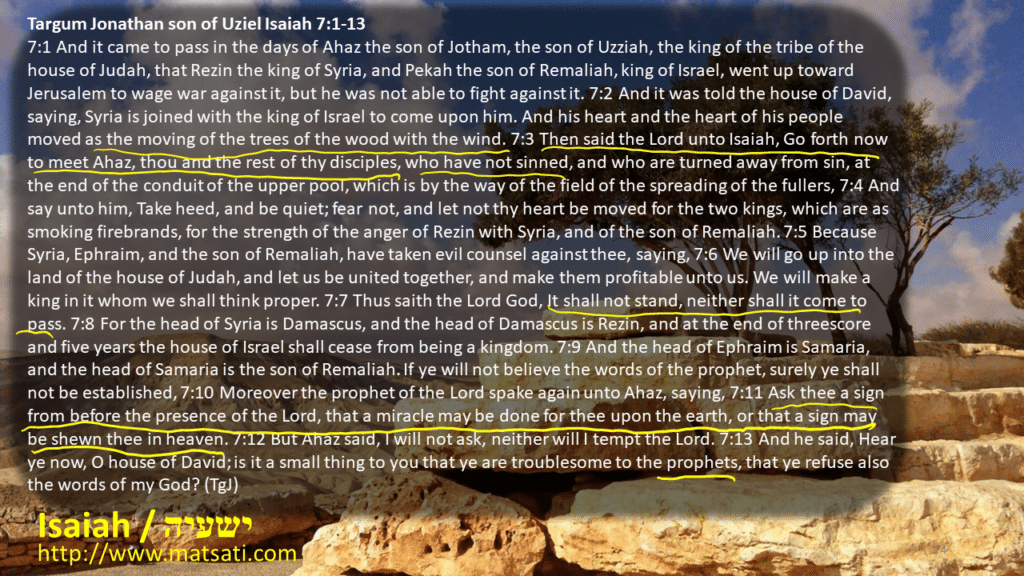
Targum Jonathan son of Uziel Isaiah 7:1-13
7:1 And it came to pass in the days of Ahaz the son of Jotham, the son of Uzziah, the king of the tribe of the house of Judah, that Rezin the king of Syria, and Pekah the son of Remaliah, king of Israel, went up toward Jerusalem to wage war against it, but he was not able to fight against it. 7:2 And it was told the house of David, saying, Syria is joined with the king of Israel to come upon him. And his heart and the heart of his people moved as the moving of the trees of the wood with the wind. 7:3 Then said the Lord unto Isaiah, Go forth now to meet Ahaz, thou and the rest of thy disciples, who have not sinned, and who are turned away from sin, at the end of the conduit of the upper pool, which is by the way of the field of the spreading of the fullers, 7:4 And say unto him, Take heed, and be quiet; fear not, and let not thy heart be moved for the two kings, which are as smoking firebrands, for the strength of the anger of Rezin with Syria, and of the son of Remaliah. 7:5 Because Syria, Ephraim, and the son of Remaliah, have taken evil counsel against thee, saying, 7:6 We will go up into the land of the house of Judah, and let us be united together, and make them profitable unto us. We will make a king in it whom we shall think proper. 7:7 Thus saith the Lord God, It shall not stand, neither shall it come to pass. 7:8 For the head of Syria is Damascus, and the head of Damascus is Rezin, and at the end of threescore and five years the house of Israel shall cease from being a kingdom. 7:9 And the head of Ephraim is Samaria, and the head of Samaria is the son of Remaliah. If ye will not believe the words of the prophet, surely ye shall not be established, 7:10 Moreover the prophet of the Lord spake again unto Ahaz, saying, 7:11 Ask thee a sign from before the presence of the Lord, that a miracle may be done for thee upon the earth, or that a sign may be shewn thee in heaven. 7:12 But Ahaz said, I will not ask, neither will I tempt the Lord. 7:13 And he said, Hear ye now, O house of David; is it a small thing to you that ye are troublesome to the prophets, that ye refuse also the words of my God? (TgJ)
Isaiah 7:1 according to the Targum that Rezin and Pekah came against Jerusalem and were unable to fight and overcome the city. Later on however we read how Syria, Ephraim, and the son of Remaliah all joined forces to attack Judah and it was at this time that Ahaz and the people were afraid. (Isaiah 7:2 and 7:5-6) Isaiah comes to Ahaz and seeks that he be faithful to trust the Lord and he fails not having faith at all in the God of Israel. The TgJ states, א וַהְוָה בְיֹומֵי אָחָז בַר יֹותָם בַר עוּזִיָה מַלַך שִבטָא דְבֵית יְהוּדָה סְלֵיק רְצִין מַלכָא דַאְרָם וּפַקַח בַר רְמַליָה מַלכָא דְיִשׂרָאֵל לִירוּשְלַם לַאְגָחָא קְרָבָא עְלַה וְלָא יְכֵיל לַאְגָחָא עְלַה׃ 7:1 And it came to pass in the days of Ahaz the son of Jotham, the son of Uzziah, the king of the tribe of the house of Judah, that Rezin the king of Syria, and Pekah the son of Remaliah, king of Israel, went up toward Jerusalem to wage war against it, but he was not able to fight against it. (TgJ) The rabbis draw out an interesting point from the Hebrew text stating the following according to the Talmud.
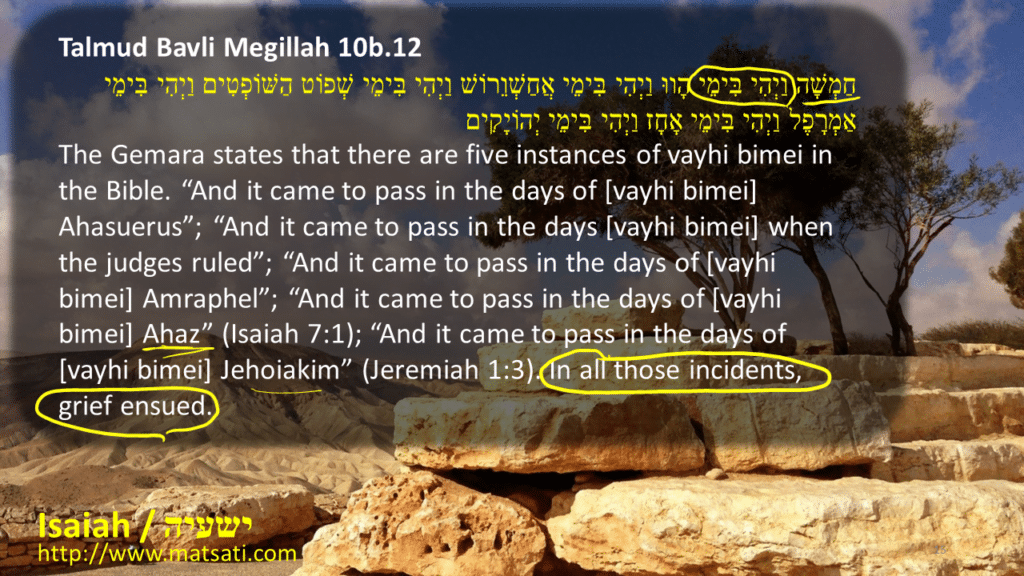
Talmud Bavli Megillah 10b.12
חַמְשָׁה וַיְהִי בִּימֵי הָווּ וַיְהִי בִּימֵי אֲחַשְׁוֵרוֹשׁ וַיְהִי בִּימֵי שְׁפוֹט הַשּׁוֹפְטִים וַיְהִי בִּימֵי אַמְרָפֶל וַיְהִי בִּימֵי אָחָז וַיְהִי בִּימֵי יְהוֹיָקִים
The Gemara states that there are five instances of vayhi bimei in the Bible. “And it came to pass in the days of [vayhi bimei] Ahasuerus”; “And it came to pass in the days [vayhi bimei] when the judges ruled”; “And it came to pass in the days of [vayhi bimei] Amraphel”; “And it came to pass in the days of [vayhi bimei] Ahaz” (Isaiah 7:1); “And it came to pass in the days of [vayhi bimei] Jehoiakim” (Jeremiah 1:3). In all those incidents, grief ensued.
The rabbis look at the Hebrew text and comment upon the phrase וַיְהִ֡י בִּימֵ֣י “and it came to pass in the days” (Isaiah 7:1 and וַהְוָה בְיֹומֵי in Aramaic) comparing these to the various times this exact phrase is stated throughout in the Scriptures. The Gemara states that at each of these locations when these words were spoken, grief ensued. Searching the LHB results in the following hits when performing a search. The rabbis leave out the example of Ruth.
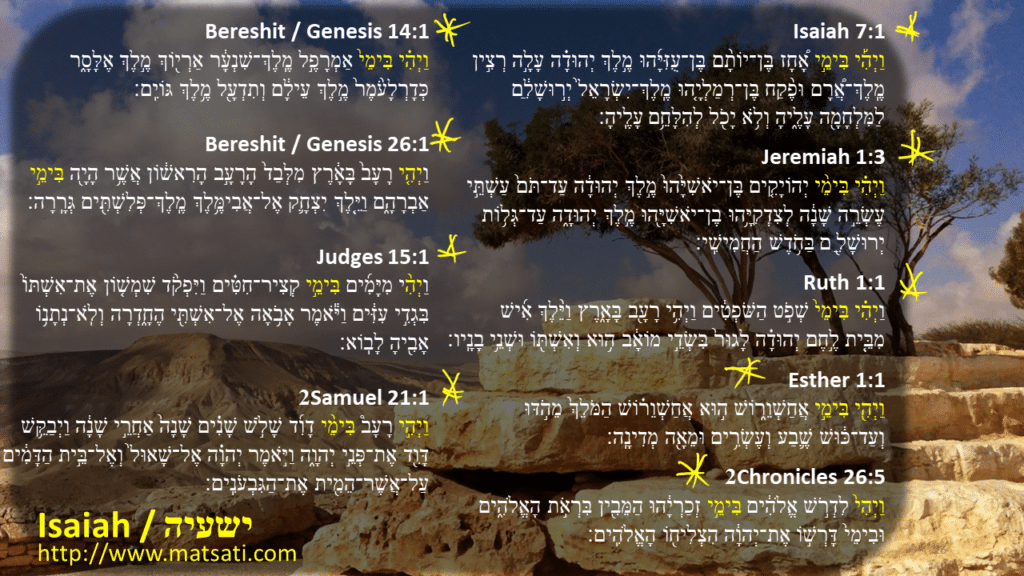
Bereshit / Genesis 14:1
וַיְהִ֗י בִּימֵי֙ אַמְרָפֶ֣ל מֶֽלֶךְ־שִׁנְעָ֔ר אַרְי֖וֹךְ מֶ֣לֶךְ אֶלָּסָ֑ר כְּדָרְלָעֹ֙מֶר֙ מֶ֣לֶךְ עֵילָ֔ם וְתִדְעָ֖ל מֶ֥לֶךְ גּוֹיִֽם׃
Bereshit / Genesis 26:1
וַיְהִ֤י רָעָב֙ בָּאָ֔רֶץ מִלְּבַד֙ הָרָעָ֣ב הָרִאשׁ֔וֹן אֲשֶׁ֥ר הָיָ֖ה בִּימֵ֣י אַבְרָהָ֑ם וַיֵּ֧לֶךְ יִצְחָ֛ק אֶל־אֲבִימֶּ֥לֶךְ מֶֽלֶךְ־פְּלִשְׁתִּ֖ים גְּרָֽרָה׃
Mishpatim / Judges 15:1
וַיְהִ֨י מִיָּמִ֜ים בִּימֵ֣י קְצִיר־חִטִּ֗ים וַיִּפְקֹ֨ד שִׁמְשׁ֤וֹן אֶת־אִשְׁתּוֹ֙ בִּגְדִ֣י עִזִּ֔ים וַיֹּ֕אמֶר אָבֹ֥אָה אֶל־אִשְׁתִּ֖י הֶחָ֑דְרָה וְלֹֽא־נְתָנ֥וֹ אָבִ֖יהָ לָבֽוֹא׃
2 Samuel 21:1
וַיְהִ֣י רָעָב֩ בִּימֵ֨י דָוִ֜ד שָׁלֹ֣שׁ שָׁנִ֗ים שָׁנָה֙ אַחֲרֵ֣י שָׁנָ֔ה וַיְבַקֵּ֥שׁ דָּוִ֖ד אֶת־פְּנֵ֣י יְהוָ֑ה וַיֹּ֣אמֶר יְהוָ֗ה אֶל־שָׁאוּל֙ וְאֶל־בֵּ֣ית הַדָּמִ֔ים עַל־אֲשֶׁר־הֵמִ֖ית אֶת־הַגִּבְעֹנִֽים׃
Isaiah 7:1
וַיְהִ֡י בִּימֵ֣י אָ֠חָז בֶּן־יוֹתָ֨ם בֶּן־עֻזִּיָּ֜הוּ מֶ֣לֶךְ יְהוּדָ֗ה עָלָ֣ה רְצִ֣ין מֶֽלֶךְ־אֲ֠רָם וּפֶ֨קַח בֶּן־רְמַלְיָ֤הוּ מֶֽלֶךְ־יִשְׂרָאֵל֙ יְר֣וּשָׁלִַ֔ם לַמִּלְחָמָ֖ה עָלֶ֑יהָ וְלֹ֥א יָכֹ֖ל לְהִלָּחֵ֥ם עָלֶֽיהָ׃
Jeremiah 1:3
וַיְהִ֗י בִּימֵ֨י יְהוֹיָקִ֤ים בֶּן־יֹאשִׁיָּ֙הוּ֙ מֶ֣לֶךְ יְהוּדָ֔ה עַד־תֹּם֙ עַשְׁתֵּ֣י עֶשְׂרֵ֣ה שָׁנָ֔ה לְצִדְקִיָּ֥הוּ בֶן־יֹאשִׁיָּ֖הוּ מֶ֣לֶךְ יְהוּדָ֑ה עַד־גְּל֥וֹת יְרוּשָׁלִַ֖ם בַּחֹ֥דֶשׁ הַחֲמִישִֽׁי׃
Ruth 1:1
וַיְהִ֗י בִּימֵי֙ שְׁפֹ֣ט הַשֹּׁפְטִ֔ים וַיְהִ֥י רָעָ֖ב בָּאָ֑רֶץ וַיֵּ֨לֶךְ אִ֜ישׁ מִבֵּ֧ית לֶ֣חֶם יְהוּדָ֗ה לָגוּר֙ בִּשְׂדֵ֣י מוֹאָ֔ב ה֥וּא וְאִשְׁתּ֖וֹ וּשְׁנֵ֥י בָנָֽיו׃
Esther 1:1
וַיְהִ֖י בִּימֵ֣י אֲחַשְׁוֵר֑וֹשׁ ה֣וּא אֲחַשְׁוֵר֗וֹשׁ הַמֹּלֵךְ֙ מֵהֹ֣דּוּ וְעַד־כּ֔וּשׁ שֶׁ֛בַע וְעֶשְׂרִ֥ים וּמֵאָ֖ה מְדִינָֽה׃
2 Chronicles 26:5
וַיְהִי֙ לִדְרֹ֣שׁ אֱלֹהִ֔ים בִּימֵ֣י זְכַרְיָ֔הוּ הַמֵּבִ֖ין בִּרְאֹ֣ת הָאֱלֹהִ֑ים וּבִימֵי֙ דָּרְשׁ֣וֹ אֶת־יְהוָ֔ה הִצְלִיח֖וֹ הָאֱלֹהִֽים׃
These words וַיְהִ֡י בִּימֵ֣י “and it came to pass in the days” (Isaiah 7:1 and וַהְוָה בְיֹומֵי in Aramaic) open to times of grief. It is in these times that the Lord God often seems distant and out of reach. The Scriptures promise a number of ways that God shows his care for us. These are promises we can cling to in times of loss. Specifically, the Lord God Almighty offers the peace of his presence. The author of Hebrews 13:5-6 reminded us that God has said, “I will never fail you. I will never abandon you.” Yeshua taught his disciples and us according to John 14:1-3 saying, “Don’t let your hearts be troubled. Trust in God, and trust also in me. There is more than enough room in my Father’s home. If these were not so, would I have told you that I am going to prepare a place for you? When everything is ready, I will come and get you, so that you will always be where I am.” The Apostle Paul wrote according to 2 Corinthians 1:3-5 saying, “All praise to God, the Father of our Lord Jesus Christ. God is our merciful Father and the source of all comfort, He comforts us in all our troubles so that we can comfort others. When they are troubled, we will be able to give them the same comfort God has given us. For the more we suffer for Christ, the more God will shower us with his comfort through Christ.” The NT commentary on the Tanach points out how God is merciful and He is to be our source of comfort, something Isaiah was trying to tell King Ahaz. When we suffer, the Lord God Almighty will comfort us. No amount of suffering or trials that the Lord cannot comfort us from. Because of this the Lord provides confidence in any trial (see Romans 8:35-38) and gives us hope of a better world (see Revelation 21:1-5).
The TgJ goes on saying according to Isaiah 7:2, ב וְאִתחַוַה לְבֵית דָוִיד לְמֵימַר אִתחַבַר מַלכָא דַאְרָם עִם מַלכָא דְיִשרָאֵל לְמֵיתֵי עְלֹוהִי וְזָע לִבֵיה וְלִיבָא דְעַמֵיה כְאִשתְדָיוּת אִילָנֵי חוּרשָא מִן קֳדָם רוּחָא׃ 7:2 And it was told the house of David, saying, Syria is joined with the king of Israel to come upon him. And his heart and the heart of his people moved as the moving of the trees of the wood with the wind. (TgJ) Here is a description of the way in which the people responded to the news of the king of Israel joining with Syria to fight against them. Rashi describes this in the following way:
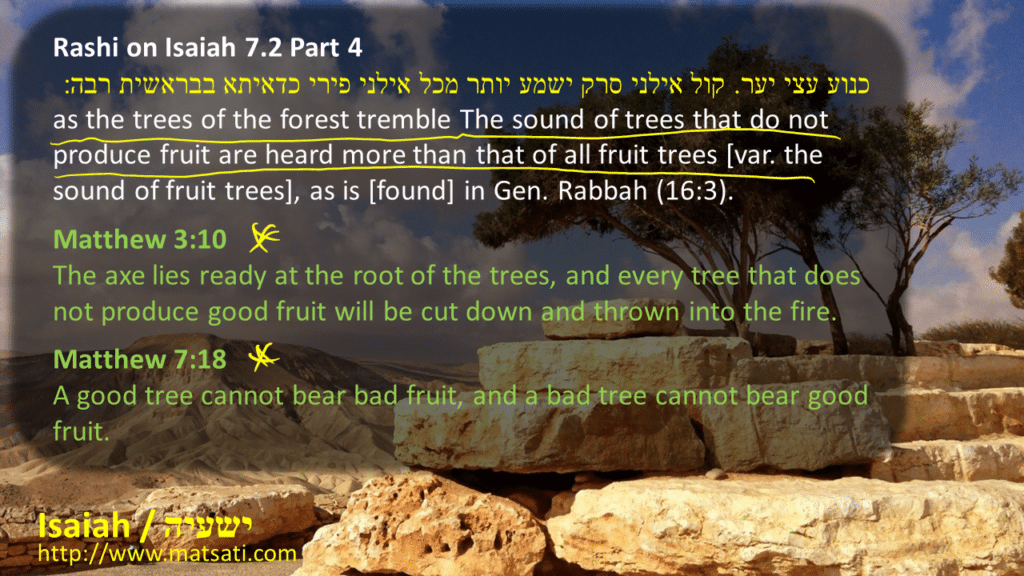
Rashi on Isaiah 7.2 Part 4
כנוע עצי יער. קול אילני סרק ישמע יותר מכל אילני פירי כדאיתא בבראשית רבה:
as the trees of the forest tremble The sound of trees that do not produce fruit are heard more than that of all fruit trees [var. the sound of fruit trees], as is [found] in Gen. Rabbah (16:3).
It is interesting how Rashi draws out the idea of the sound of the wind passing through a forest, how the trees that do not produce fruit are heard more than all of the fruit trees. This is an analogy to the trees that do not produce fruit as being those who do not know the Lord, and those who do produce fruit as those who are the children of God. The unfruitful trees are greater in number in this world. We note the following references from the NT.
Matthew 3:10
The axe lies ready at the root of the trees, and every tree that does not produce good fruit will be cut down and thrown into the fire.
Matthew 7:18
A good tree cannot bear bad fruit, and a bad tree cannot bear good fruit.
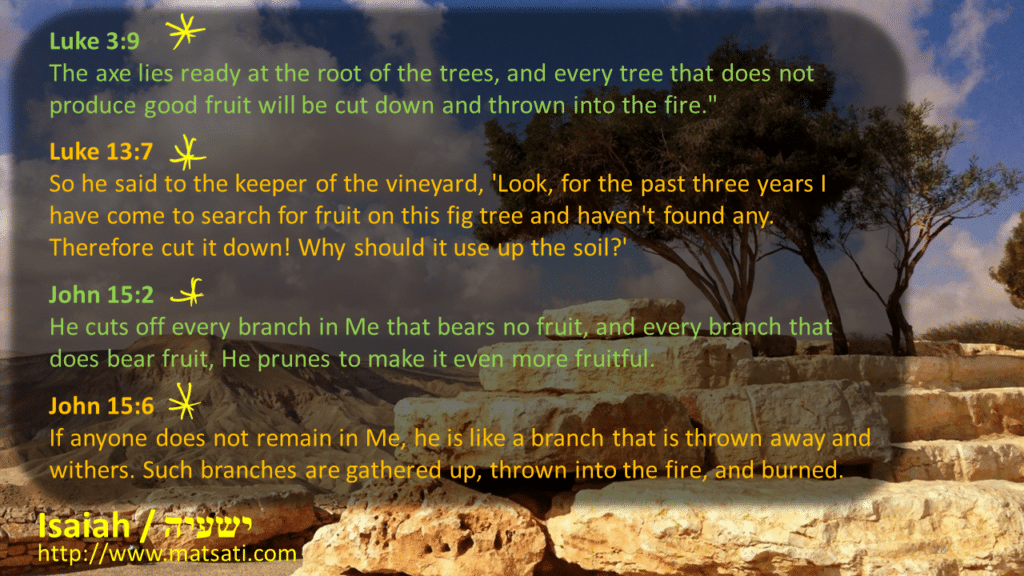
Luke 3:9
The axe lies ready at the root of the trees, and every tree that does not produce good fruit will be cut down and thrown into the fire.”
Luke 13:7
So he said to the keeper of the vineyard, ‘Look, for the past three years I have come to search for fruit on this fig tree and haven’t found any. Therefore cut it down! Why should it use up the soil?’
John 15:2
He cuts off every branch in Me that bears no fruit, and every branch that does bear fruit, He prunes to make it even more fruitful.
John 15:6
If anyone does not remain in Me, he is like a branch that is thrown away and withers. Such branches are gathered up, thrown into the fire, and burned.
We note how these Scriptures coupled with the Isaiah text express the terrible fate of those who do not produce fruit, or said in another way, “whose life is not good.” Yeshua the Messiah warned his followers against being hearers only. The Greek text (πᾶν δένδρον μὴ ποιοῦν καρπόν) implies that all trees will be cut down unless there is a reason for the contrary. The way this is written it seems as if all men are destined to perish if the fruit of the spirit is not produced in them. This is the natural outcome of sin which causes separation from God’s presence. Yeshua, according to John 15:6, speaks of not remaining in him and being a branch that is thrown away. The idea is that of a vine dresser, who looks at the grape vine and takes away the unfruitful portions. The interesting thing about the grape vine is that the vine itself has the tendency to drain the strength and life away from the fruit that is on the vine. So the extra vines that are not producing fruit, these are pruned away so as not to draw strength and life from the fruit, those who remain in the Messiah. This is an interesting property of the vine making it a perfect analogy of our remaining in the Lord, keeping the faith, and being faithful as producing the fruit of the Spirit. If this does not happen, there is nothing left but the burn pile. (Hell) The interesting thing about the vine is that it is useless for anything other than burning, the wood is not strong enough to support any kind of building. The analogy of the fire here is to the judgement of God, which comes to those who refuse to listen and obey.
Isaiah 7:3-9 state the following, ג וַאְמַר יוי לִישַעיָה פֹוק כְעַן לְקַדָמוּת אָחָז אַת וּשאָר דְלָא חְטֹו וּדתָבוּ מֵחִטאָה תַלמִידָך לִסְיָפֵי מְזִיקַת בְרֵיכְתָא עִלִיתָא דִי בְכֵיבַש חְקַל מַשטַח קָצְרַיָא׃ 7:3 Then said the Lord unto Isaiah, Go forth now to meet Ahaz, thou and the rest of thy disciples, who have not sinned, and who are turned away from sin, at the end of the conduit of the upper pool, which is by the way of the field of the spreading of the fullers, ד וְתֵימַר לֵיה אִסתְמַר וְנוּח לָא תִדחַל וְלִיבָך לָא יְזוּעַ מִן קֳדָם תְרֵין מַלכַיָא דְאִינוּן כְאוּדַיָא מְתַנְנַיָא הָאִילֵין בִתקֹוף רְגַז רְצִין וַאְרָם וּבַר רְמַליָה׃ 7:4 And say unto him, Take heed, and be quiet; fear not, and let not thy heart be moved for the two kings, which are as smoking firebrands, for the strength of the anger of Rezin with Syria, and of the son of Remaliah. ה חְלָף אְרֵי מְלַך עְלָך אְרָם בִישָא אַפרַיִם וּבַר רְמַליָה לְמֵימַר׃ 7:5 Because Syria, Ephraim, and the son of Remaliah, have taken evil counsel against thee, saying, ו נִיסַק בְאַרעָא דְבֵית יְהוּדָה וּנחַבְרִינוּן וּנשַוֵינוּן עִימַנָא וְנַמלִיך מַלכָא בְגַוַה יָת מַן דְכָשַר לַנָא׃ 7:6 We will go up into the land of the house of Judah, and let us be united together, and make them profitable unto us. We will make a king in it whom we shall think proper. ז כִדנָן אְמַר יוי אְלֹהִים לָא תְקוּם וְלָא תְהֵי׃ 7:7 Thus saith the Lord God, It shall not stand, neither shall it come to pass. ח אְרֵי רֵיש אְרָם דַמַשַק וְרֵיש דַמַשַק רְצִין וּבסֹוף שִתִין וַחְמֵיש שְנִין יִבטְלוּן בֵית יִשׂרָאֵל מִמַלכוּ׃ 7:8 For the head of Syria is Damascus, and the head of Damascus is Rezin, and at the end of threescore and five years the house of Israel shall cease from being a kingdom. ט וְרֵיש אַפרַיִם שֹמְרֹון וְרֵיש שֹמְרֹון בַר רְמַליָהוּ אִם לָא תְהֵימְנוּן לְמִילֵי נְבִיַיָא אְרֵי לָא תִתקַיְימוּן׃ 7:9 And the head of Ephraim is Samaria, and the head of Samaria is the son of Remaliah. If ye will not believe the words of the prophet, surely ye shall not be established (TgJ) Ibn Ezra looks at Isaiah 7:9 making the following observation.
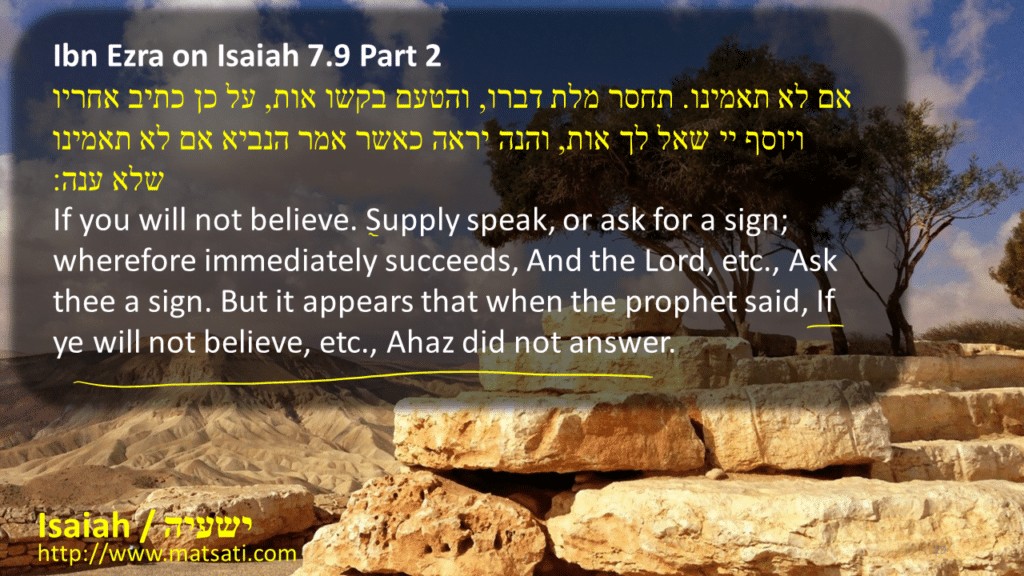
Ibn Ezra on Isaiah 7.9 Part 2
אם לא תאמינו. תחסר מלת דברו, והטעם בקשו אות, על כן כתיב אחריו ויוסף יי שאל לך אות, והנה יראה כאשר אמר הנביא אם לא תאמינו שלא ענה:
If you will not believe. Supply speak, or ask for a sign; wherefore immediately succeeds, And the Lord, etc., Ask thee a sign. But it appears that when the prophet said, If ye will not believe, etc., Ahaz did not answer.
Something to note about what we have been studying is that faith takes action, faith is not a silent partner. From a Torah perspective, we note that as Israel was in the wilderness on their way to the Promised Land, the people murmured against Moshe and Aaron because “there was no water for the congregation” (Bamidbar / Numbers 20:2). We read on and the text states, “And the people contended with Moses and spoke, saying: ‘If only we had died when our brethren died before the Lord!'” (Bamidbar / Numbers 20:4). Because of this both Moshe and Aaron “went from the presence of the assembly unto the door of the tabernacle of the congregation, and they fell upon their faces” (Bamidbar / Numbers 20:6). The Lord then spoke to Moshe and Aaron to take the rod of God, and speak to the rock before the eyes of the people to bring forth water. (Bamidbar / Numbers 20:8) When they returned before the people, instead of speaking, Moshe took the rod and struck the rock and made the statement, “Hear now, you rebels! Must we bring water for you out of this rock?” (Bamidbar / Numbers 20:10). By Moshe’s actions and his statement, he gave honor and glory to himself and not to the Lord. We note that God was faithful to cause water to come out of the rock, but the Lord tells Moshe saying, “Because you did not believe Me, to hallow Me in the eyes of the children of Israel, therefore you shall not bring this congregation into the land which I have given them” (Bamidbar / Numbers 20:12). We note that this is not the kind of action that one is to take by faith. Moshe disobeyed God while at the same time believing he was fulfilling the word of the Lord. God said to Moshe, “you did not believe Me” which suggests something about why Moshe said and did. We note that faith that counts according to the Torah is the faith that obeys! This is the same kind of faith that Yeshua is speaking about concerning the production of fruit. When we disobey the commands of God it means that we have a lack of faith in God’s word. Here in Isaiah 7:9 Ahaz had no faith, and he had so little faith he was unwilling to even respond in word, not to mention the deeds that God expects from us according to His word.
Isaiah 7:10-11 continues saying, וְאֹוסֵיף נְבִייָא דַיוי מַלֵיל עִם אָחָז לְמֵימַר׃ 7:10 Moreover the prophet of the Lord spake again unto Ahaz, saying, יא שְאַל לָך אָתָא מִן קֳדָם יוי אְלָהָך שְאַל דְיִתעְבֵיד לָך נֵס עַל אַרעָא אֹו תִיתַחזֵי לָך אָת בִשמַיָא׃ 7:11 Ask thee a sign from before the presence of the Lord, that a miracle may be done for thee upon the earth, or that a sign may be shewn thee in heaven. (TgJ) Rashi states the following concerning this verse.
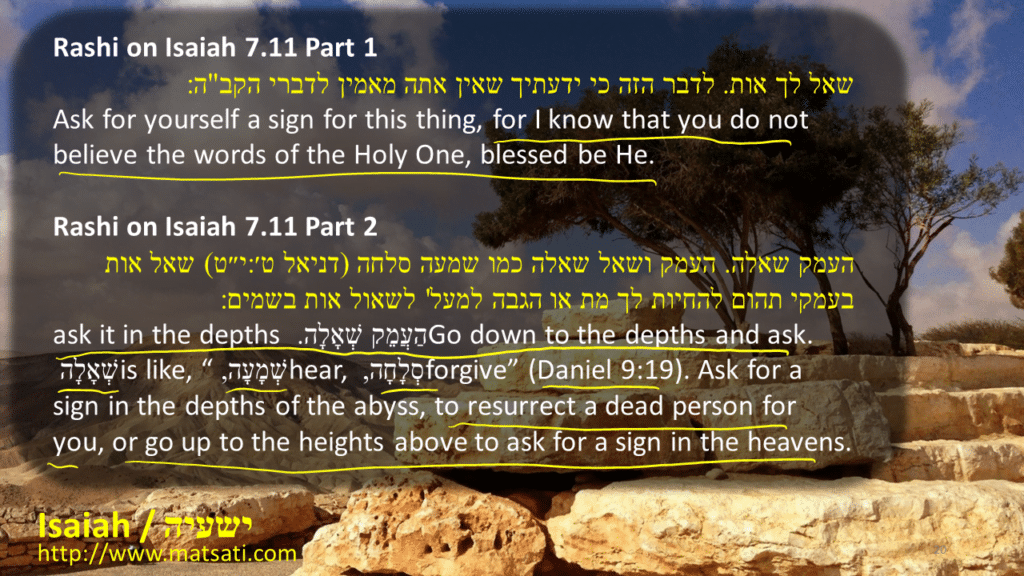
Rashi on Isaiah 7.11 Part 1
שאל לך אות. לדבר הזה כי ידעתיך שאין אתה מאמין לדברי הקב”ה:
Ask for yourself a sign for this thing, for I know that you do not believe the words of the Holy One, blessed be He.
Rashi on Isaiah 7.11 Part 2
העמק שאלה. העמק ושאל שאלה כמו שמעה סלחה (דניאל ט׳:י״ט) שאל אות בעמקי תהום להחיות לך מת או הגבה למעל’ לשאול אות בשמים:
ask it in the depths הַעֲמֵק שְׁאָלָה. Go down to the depths and ask. שְׁאָלָה is like, “שְׁמָעָה, hear, סְלָחָה, forgive” (Daniel 9:19). Ask for a sign in the depths of the abyss, to resurrect a dead person for you, or go up to the heights above to ask for a sign in the heavens.
Does Isaiah ask a rhetorical question? Rashi says Isaiah asks Ahaz to do something not having the faith to fulfill what he is being asked. In this case it may be Isaiah’s intention to start a discourse, or as a means of displaying or emphasizing his intent in asking the question. A Torah based theme that permeates all of scripture, that we are to trust in God instead of ourselves. The God of Israel is telling the kings of Israel and Judah that they are not to rely upon political alliances or military technology (ie chariots). We note that the Lord God Almighty has on more than one occasion delivered His people from insurmountable odds. Thus, Ahaz could have rationally relied on God for protection against Israel and Syria, and against anything that might come his way. Ahaz in fact was relying upon his deal with Assyria (2 Chronicles 28:16-25). So the idea is that Ahaz could have been trusting in his deal when he responded saying that he would tempt God by asking. He may be thinking that his own arrangement was better than asking God for help. Ahaz may have been taking a pious approach as a form of deception. Ahaz maybe quoting from Devarim / Deuteronomy 6:16 לֹ֣א תְנַסּ֔וּ אֶת־יְהוָ֖ה אֱלֹהֵיכֶ֑ם כַּאֲשֶׁ֥ר נִסִּיתֶ֖ם בַּמַּסָּֽה׃ 6:16 You shall not put the LORD your God to the test, as you tested Him at Massah. (NASB) This may be why the Lord God got upset at Ahaz. On top of this, Ahaz’s agreement with Assyria led to his worshipping the Assyrian idols. It is likely the reason Ahaz refused to request a sign from God because his trust wasn’t in the Lord but in his own actions.
Isaiah 7:12 states, יב וַאְמַר אָחָז לָא אַשאַל וְלָא אְנַסֵי קֳדָם יוי׃ 7:12 But Ahaz said, I will not ask, neither will I tempt the Lord. (TgJ) Ahaz saying both not asking (לָא אַשאַל) and not tempting (וְלָא אְנַסֵי) it’s clear obviously he is admitting his lack of faith. Akeidat Yitzhak states the following concerning this verse.
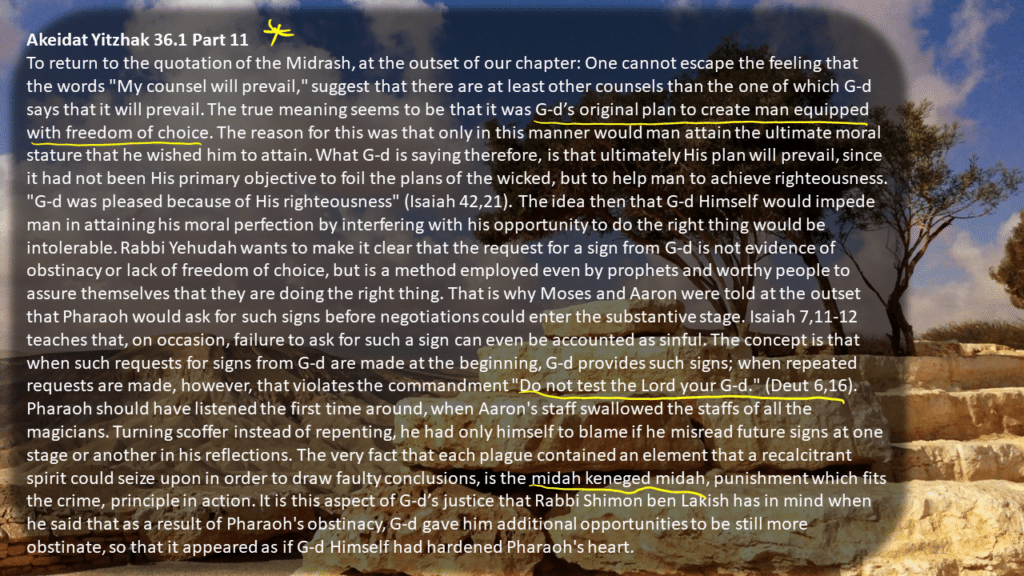
Akeidat Yitzhak 36.1 Part 11
To return to the quotation of the Midrash, at the outset of our chapter: One cannot escape the feeling that the words “My counsel will prevail,” suggest that there are at least other counsels than the one of which G-d says that it will prevail. The true meaning seems to be that it was G-d’s original plan to create man equipped with freedom of choice. The reason for this was that only in this manner would man attain the ultimate moral stature that he wished him to attain. What G-d is saying therefore, is that ultimately His plan will prevail, since it had not been His primary objective to foil the plans of the wicked, but to help man to achieve righteousness. “G-d was pleased because of His righteousness” (Isaiah 42,21). The idea then that G-d Himself would impede man in attaining his moral perfection by interfering with his opportunity to do the right thing would be intolerable. Rabbi Yehudah wants to make it clear that the request for a sign from G-d is not evidence of obstinacy or lack of freedom of choice, but is a method employed even by prophets and worthy people to assure themselves that they are doing the right thing. That is why Moses and Aaron were told at the outset that Pharaoh would ask for such signs before negotiations could enter the substantive stage. Isaiah 7,11-12 teaches that, on occasion, failure to ask for such a sign can even be accounted as sinful. The concept is that when such requests for signs from G-d are made at the beginning, G-d provides such signs; when repeated requests are made, however, that violates the commandment “Do not test the Lord your G-d.” (Deut 6,16). Pharaoh should have listened the first time around, when Aaron’s staff swallowed the staffs of all the magicians. Turning scoffer instead of repenting, he had only himself to blame if he misread future signs at one stage or another in his reflections. The very fact that each plague contained an element that a recalcitrant spirit could seize upon in order to draw faulty conclusions, is the midah keneged midah, punishment which fits the crime, principle in action. It is this aspect of G-d’s justice that Rabbi Shimon ben Lakish has in mind when he said that as a result of Pharaoh’s obstinacy, G-d gave him additional opportunities to be still more obstinate, so that it appeared as if G-d Himself had hardened Pharaoh’s heart.
Akeidat Yitzhak points out the significance of our being created with the freedom of choice and the purpose was for our choosing moral stature. The point was to realize that it is not God’s plan to destroy the wicked, but to help man to be righteous. We note what Ezekiel says according to Ezekiel 18:23, הֶחָפֹ֤ץ אֶחְפֹּץ֙ מ֣וֹת רָשָׁ֔ע נְאֻ֖ם אֲדֹנָ֣י יְהוִ֑ה הֲל֛וֹא בְּשׁוּב֥וֹ מִדְּרָכָ֖יו וְחָיָֽה׃ “Do I have any pleasure at all that the wicked should die?” says the Lord GOD, “and not that he should turn from his ways and live?” (KJV) Our God is a God of life, not of death or one who puts people to death. Rabbi Yehudah states “the request for a sign from G-d is not evidence of obstinacy or lack of freedom of choice, but is a method employed even by prophets and worthy people to assure themselves that they are doing the right thing.” The Torah example is given of Pharaoh and his not believing what God has shown him through Moshe with the staff turning into a snake. The concept of מדה קנגד מדה (midah keneged midah) which means “measure for measure” is mentioned in relation to God’s punishment. For example, God punishes evildoers with a punishment that fits the crime called in hebrew מדה קנגד מדה (measure for measure), Cain wanted to remove Abel from his family through murder of his brother, and so God banished Cain from his family. Another example could be taken from Yaakov (Jacob) life, where he masqueraded as his brother Esau to his dad Isaac, and in the Midrash on this connects this to Laban successful deception regarding his daughters Rachael and Leah. Throughout the Torah, especially in Bereshit / Genesis, we read various stories of lies and deception. Many of these involve the patriarchs and matriarchs. A couple examples, Abraham deceived both Pharaoh and Avimelech saying his wife was his sister. Rachael lied to her father about menstruation to hide the idols she stole from him. Would each of these examples be ethically defensible if done so to preserve a life? The Mishnah Sotah 1:8 states the following concerning these things.
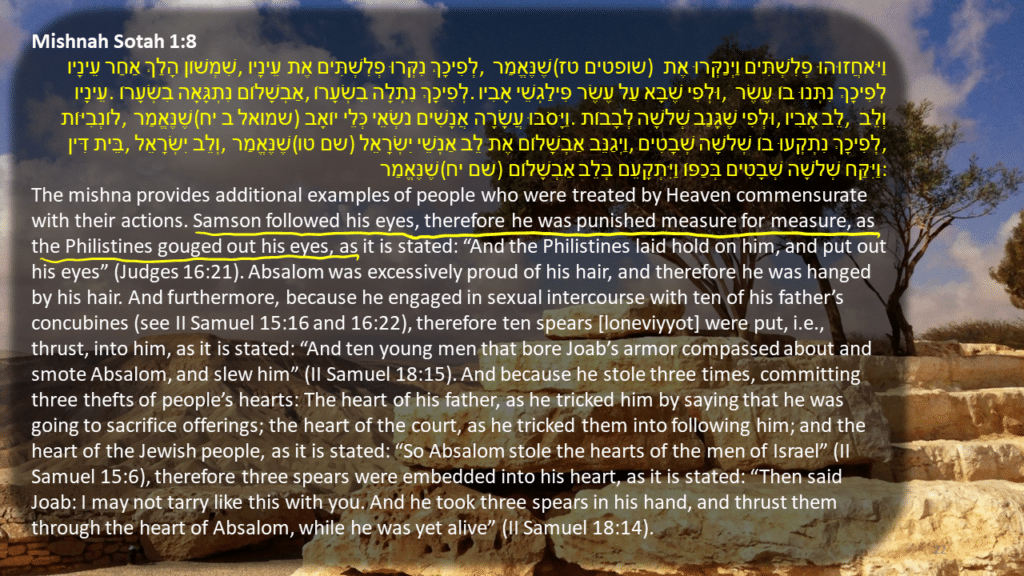
Mishnah Sotah 1:8
שִׁמְשׁוֹן הָלַךְ אַחַר עֵינָיו, לְפִיכָךְ נִקְּרוּ פְלִשְׁתִּים אֶת עֵינָיו, שֶׁנֶּאֱמַר (שופטים טז) וַיֹּאחֲזוּהוּ פְלִשְׁתִּים וַיְנַקְּרוּ אֶת עֵינָיו. אַבְשָׁלוֹם נִתְגָּאָה בִשְׂעָרוֹ, לְפִיכָךְ נִתְלָה בִשְׂעָרוֹ. וּלְפִי שֶׁבָּא עַל עֶשֶׂר פִּילַגְשֵׁי אָבִיו, לְפִיכָךְ נִתְּנוּ בוֹ עֶשֶׂר לוֹנְבִיּוֹת, שֶׁנֶּאֱמַר (שמואל ב יח) וַיָּסֹבּוּ עֲשָׂרָה אֲנָשִׁים נֹשְׂאֵי כְּלֵי יוֹאָב. וּלְפִי שֶׁגָּנַב שְׁלשָׁה לְבָבוֹת, לֵב אָבִיו, וְלֵב בֵּית דִּין, וְלֵב יִשְׂרָאֵל, שֶׁנֶּאֱמַר (שם טו) וַיְגַנֵּב אַבְשָׁלוֹם אֶת לֵב אַנְשֵׁי יִשְׂרָאֵל, לְפִיכָךְ נִתְקְעוּ בוֹ שְׁלשָׁה שְׁבָטִים, שֶׁנֶּאֱמַר (שם יח) וַיִּקַּח שְׁלשָׁה שְׁבָטִים בְּכַפּוֹ וַיִּתְקָעֵם בְּלֵב אַבְשָׁלוֹם:
The mishna provides additional examples of people who were treated by Heaven commensurate with their actions. Samson followed his eyes, therefore he was punished measure for measure, as the Philistines gouged out his eyes, as it is stated: “And the Philistines laid hold on him, and put out his eyes” (Judges 16:21). Absalom was excessively proud of his hair, and therefore he was hanged by his hair. And furthermore, because he engaged in sexual intercourse with ten of his father’s concubines (see II Samuel 15:16 and 16:22), therefore ten spears [loneviyyot] were put, i.e., thrust, into him, as it is stated: “And ten young men that bore Joab’s armor compassed about and smote Absalom, and slew him” (II Samuel 18:15). And because he stole three times, committing three thefts of people’s hearts: The heart of his father, as he tricked him by saying that he was going to sacrifice offerings; the heart of the court, as he tricked them into following him; and the heart of the Jewish people, as it is stated: “So Absalom stole the hearts of the men of Israel” (II Samuel 15:6), therefore three spears were embedded into his heart, as it is stated: “Then said Joab: I may not tarry like this with you. And he took three spears in his hand, and thrust them through the heart of Absalom, while he was yet alive” (II Samuel 18:14).
We note that the Mishnah (Sotah 1:8) emphasizes this concept of מדה קנגד מדה (measure for measure) in the examples that are given. Samson followed the wants and desires of the eyes and so his punishment was to have his eyes removed. Absalom was excessively proud of his hair so it was by his hair that he hung from the tree and died. Ten spears were thrust into him each for the concubines (פילגשים) of his father that he slept with. On the other hand, the righteous are rewarded with regard to their good deeds (Talmud Sotah 9b:6-10). Various examples are given of Miriam waiting on the baby Moshe (Shemot / Exodus 2:4), so the people waited on her (Bamidbar / Numbers 12:15). Joseph merited to bury his father in a great display of honor (Bereshit / Genesis 50:7-9). Joseph’s righteous deeds merited him to be buried in the Land of Israel (Shemot / Exodus 13:19). And finally Moshe merited to be buried by God Himself (Devarim / Deuteronomy 34:6). Note the Mishnah comments that “Not only with regard to Moses did the Sages say that God takes part in his burial, but also with regard to all the righteous individuals, as it is stated: ‘Your righteousness shall go before you and the glory of the Lord shall gather you in’ (Isaiah 58:8).” The idea of מדה קנגד מדה (measure for measure) also comes from Parashat Lech Lecha.
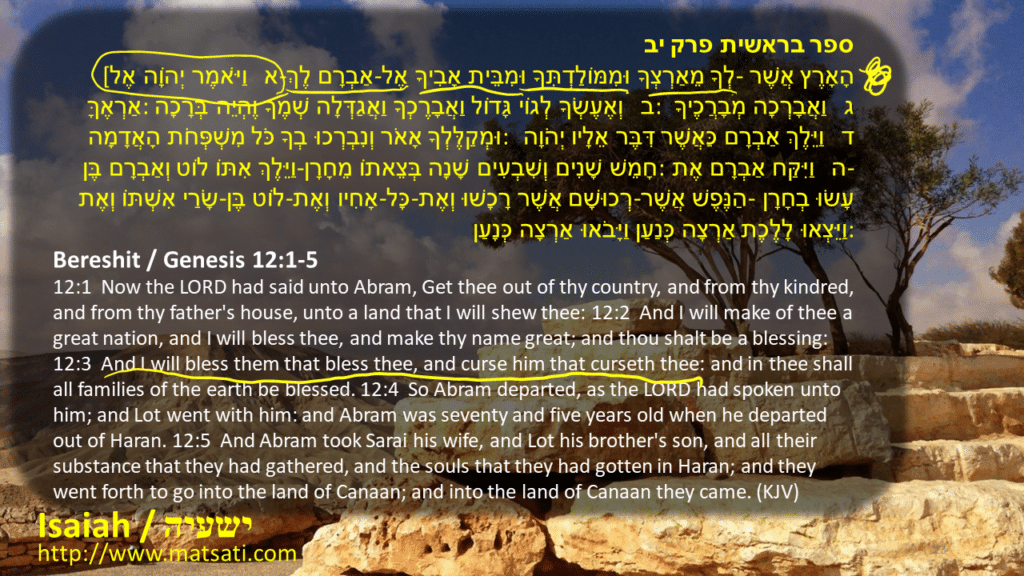
ספר בראשית פרק יב
[א וַיֹּאמֶר יְהוָֹה אֶל-אַבְרָם לֶךְ-לְךָ מֵאַרְצְךָ וּמִמּוֹלַדְתְּךָ וּמִבֵּית אָבִיךָ אֶל-הָאָרֶץ אֲשֶׁר אַרְאֶךָּ: ב וְאֶעֶשְֹךָ לְגוֹי גָּדוֹל וַאֲבָרֶכְךָ וַאֲגַדְּלָה שְׁמֶךָ וֶהְיֵה בְּרָכָה: ג וַאֲבָרְכָה מְבָרֲכֶיךָ וּמְקַלֶּלְךָ אָאֹר וְנִבְרְכוּ בְךָ כֹּל מִשְׁפְּחֹת הָאֲדָמָה: ד וַיֵּלֶךְ אַבְרָם כַּאֲשֶׁר דִּבֶּר אֵלָיו יְהֹוָה וַיֵּלֶךְ אִתּוֹ לוֹט וְאַבְרָם בֶּן-חָמֵשׁ שָׁנִים וְשִׁבְעִים שָׁנָה בְּצֵאתוֹ מֵחָרָן: ה וַיִּקַּח אַבְרָם אֶת-שָֹרַי אִשְׁתּוֹ וְאֶת-לוֹט בֶּן-אָחִיו וְאֶת-כָּל-רְכוּשָׁם אֲשֶׁר רָכָשׁוּ וְאֶת-הַנֶּפֶשׁ אֲשֶׁר-עָשֹוּ בְחָרָן וַיֵּצְאוּ לָלֶכֶת אַרְצָה כְּנַעַן וַיָּבֹאוּ אַרְצָה כְּנָעַן:
Bereshit / Genesis 12:1-5
12:1 Now the LORD had said unto Abram, Get thee out of thy country, and from thy kindred, and from thy father’s house, unto a land that I will shew thee: 12:2 And I will make of thee a great nation, and I will bless thee, and make thy name great; and thou shalt be a blessing: 12:3 And I will bless them that bless thee, and curse him that curseth thee: and in thee shall all families of the earth be blessed. 12:4 So Abram departed, as the LORD had spoken unto him; and Lot went with him: and Abram was seventy and five years old when he departed out of Haran. 12:5 And Abram took Sarai his wife, and Lot his brother’s son, and all their substance that they had gathered, and the souls that they had gotten in Haran; and they went forth to go into the land of Canaan; and into the land of Canaan they came. (KJV)
God said וַאֲבָרְכָה מְבָרֲכֶיךָ וּמְקַלֶּלְךָ אָאֹר וְנִבְרְכוּ בְךָ כֹּל מִשְׁפְּחֹת הָאֲדָמָה 12:3 And I will bless them that bless thee, and curse him that curseth thee: and in thee shall all families of the earth be blessed. (KJV) illustrating the principle of מדה קנגד מדה (measure for measure). The mishna provides examples of people who were treated by Heaven commensurate with their actions and the previous two mishnayot, Sotah 1:6-7 teaches that people are punished in a manner that fits their crime. This is consistent with the “eye for an eye and tooth for a tooth” (Shemot / Exodus 21:24) which is a command to make the penalty for an infraction to be proportionate to the crime. Note that Shemot / Exodus 21:1 states, “Now these are the rules that you shall set before them” which refers to the proper adjudication of an infraction by the governing authorities. This is to prevent judges from making an unjust ruling, and to stop an individual from carrying out vigilante justice as the judge and jury. As time progressed however, the men believed that this allowed for vengeful violence and that this was somehow righteous. Because of this Yeshua taught us, according to Matthew 5:38-39.
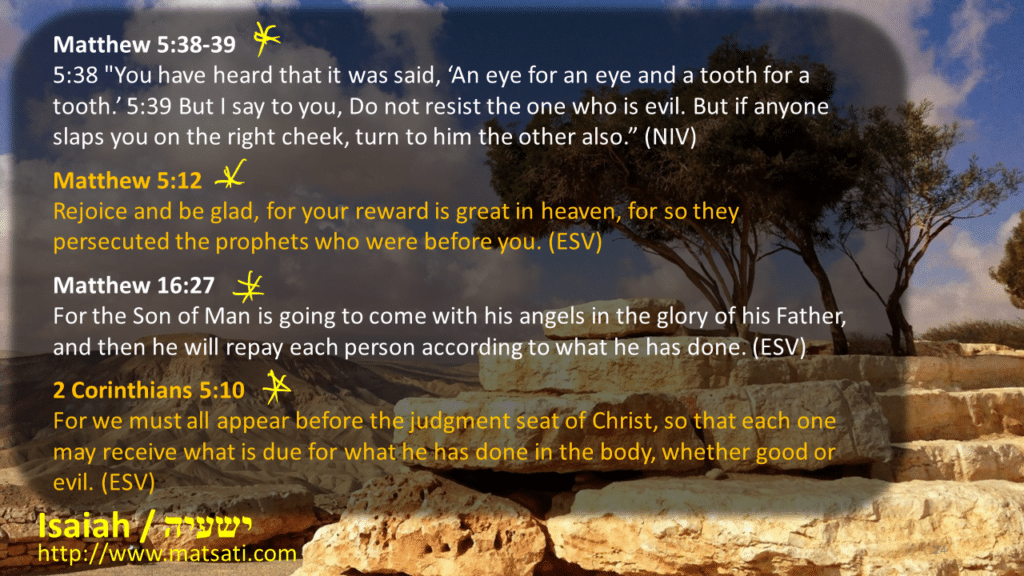
Matthew 5:38-39
5:38 “You have heard that it was said, ‘An eye for an eye and a tooth for a tooth.’ 5:39 But I say to you, Do not resist the one who is evil. But if anyone slaps you on the right cheek, turn to him the other also.” (NIV)
So the idea is if someone does us wrong, via a crime, injustice, insult, etc, we are not to act vengefully to exact payment for the crime. This doesn’t mean we are to ignore injustice, things should be done legally, but teaches us that as an individual we are not to exact an eye-to-eye punishment in return. Notice how consistent this is with the mishnah as teaching that people are also rewarded in a manner that fits their good deeds. This is the idea of do unto others what you would want done unto yourself. The examples of good deeds in this mishnah are those of kindness, waiting for people in their time of need and especially taking care of the dead, which is considered the highest act of kindness in Judaism. We also note that as a person received punishments commensurate to his sin, the counterpart to this when a person does good, the rewards are greater than the good deed performed. Note the following is only a short list of references to the NT passages that support this interpretation; there are many more verses like these.
Matthew 5:12
Rejoice and be glad, for your reward is great in heaven, for so they persecuted the prophets who were before you. (ESV)
Matthew 16:27
For the Son of Man is going to come with his angels in the glory of his Father, and then he will repay each person according to what he has done. (ESV)
2 Corinthians 5:10
For we must all appear before the judgment seat of Christ, so that each one may receive what is due for what he has done in the body, whether good or evil. (ESV)
James 1:12
Blessed is the man who remains steadfast under trial, for when he has stood the test he will receive the crown of life, which God has promised to those who love HIM. (ESV)
Revelation 22:12
“Behold, I am coming soon, bringing my recompense with me, to repay everyone for what he has done. (ESV)
We note that this principle of the “eye for an eye and tooth for a tooth” also offers the opportunity for grace, take for example if a person perpetrates the loss of a limb to his neighbor. This results in loss of livelihood, diminished ability to work, pain and suffering that he is forced to live the rest of his life with, thinking about this results in a profound amount of damage to the neighbor, in this case one truly deserves to have the same done to him. Because of this the one who has caused this should beg for forgiveness from the injured person for what he has done and perform Teshuvah (repentance) to God coupled with making serious life changes such that this will not happen again or be repeated. We also note the response we get from God because of what Yeshua has done on our behalf. We are shown mercy, we are shown grace, the evil deeds that we have committed before God are forgiven, and we do not receive the penalty in the Olam Haba (The World to Come) for our actions.
Isaiah continues saying according to Isaiah 7:13 states, יג וַאְמַר שְמַעוּ כְעַן בֵית דָוִיד הַזְעֵיר † דְאַתוּן מַהלַן יָת נְבִיַיָא אְרֵי תַהלֹון אַף יָת פִתגָמֵי אְלָהִי׃ 7:13 And he said, Hear ye now, O house of David; is it a small thing to you that ye are troublesome to the prophets, that ye refuse also the words of my God? (TgJ) Isaiah puts into context Ahaz’s refusal to request a sign from God, asking if it is an easy thing to trouble a prophet, to also refuse the words of God. Some believe that the refusal or rejection of God’s Word is an easy thing, but the day will come when all men, women, and children will be faced with their decisions and stand before the Living God! Rashi states the following concerning these things.
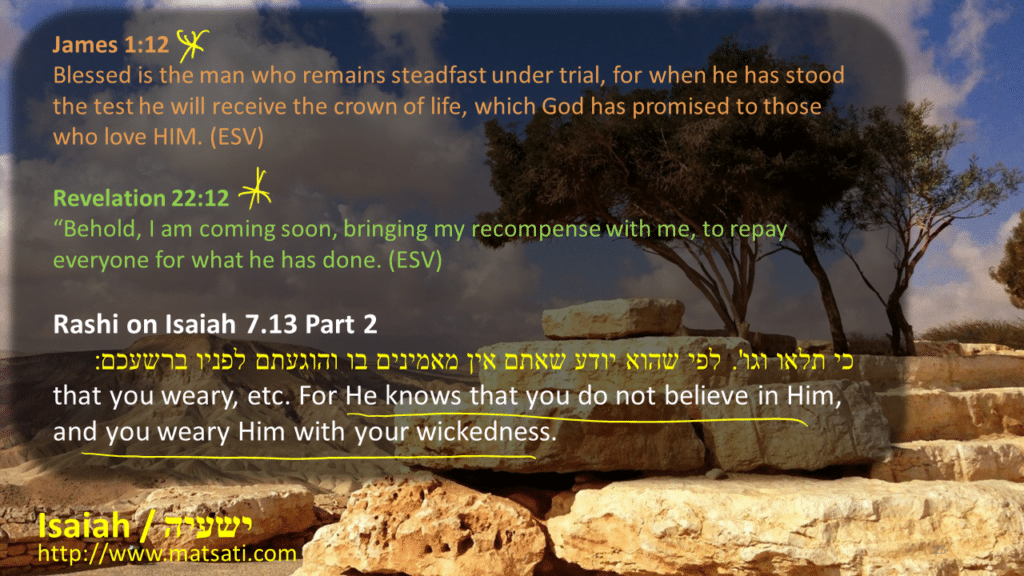
Rashi on Isaiah 7.13 Part 2
כי תלאו וגו’. לפי שהוא יודע שאתם אין מאמינים בו והוגעתם לפניו ברשעכם:
that you weary, etc. For He knows that you do not believe in Him, and you weary Him with your wickedness.
The Lord God Almighty knows whether one believes or does not believe, whether one is faithful or not, and the idea is that God knows all and nothing can be hidden from Him as Ahaz is attempting to hide this from the prophet. The point that we should take very seriously is God said in Bereshit / Genesis 12:3, saying וַאֲבָרְכָה מְבָרֲכֶיךָ וּמְקַלֶּלְךָ אָאֹר וְנִבְרְכוּ בְךָ כֹּל מִשְׁפְּחֹת הָאֲדָמָה 12:3 And I will bless them that bless thee, and curse him that curseth thee: and in thee shall all families of the earth be blessed. (KJV) illustrating the concept of מדה קנגד מדה (midah keneged midah) “measure for measure.” Something to note is that we do not see any indication in the Scriptures that man followed literally the “eye for an eye” command. There is no biblical account of an Israelite being maimed as a result of this law. Also, before this particular law was given, God had already established a judicial system to hear cases and determine penalties (see Shemot / Exodus 18:13–26) There are however examples of this that God gives to those who walk in unrepentant sin throughout their lives as enumerated according to the Mishnah Sotah 1:6-8. We also note that the giving of this “new” command is not about nullifying the Torah command (Matthew 5:17) but Yeshua is separating our responsibility from the government’s responsibility to punish evildoers in justice. We are not to seek retribution for personal infractions, we are told to turn the other cheek. We should be willing to give of ourselves and our personal possessions to those who seek to borrow, and even to the one who demands from us unjustly. We are to be good to our enemies, even to pray for those who hate us (Matthew 5:43-48). We note how the Torah illustrates how God cares about not just spiritual things, but also about how we live our lives here on earth, and the reason is these things are related to sin as sin causes one to live in such a way as to forsake the truth which leads to the eventual loss of relationship with the Lord. The mitzvah on an “eye for an eye” is designed to lead us to forgiveness as opposed to seeking personal vengeance. The reminder is that God, who is the real judge will bring justice one day. All of these things, of being merciful, of forgiving, loving, and praying, these things are only possible with the power and the presence of God in our lives, and this comes by faith in the Messiah. All of these things are guiding and directing us to what the Lord God Almighty is going to do through the prophet, to proclaim a messianic expectation of the one who will deliver the people as we see according to Isaiah 7:14.
